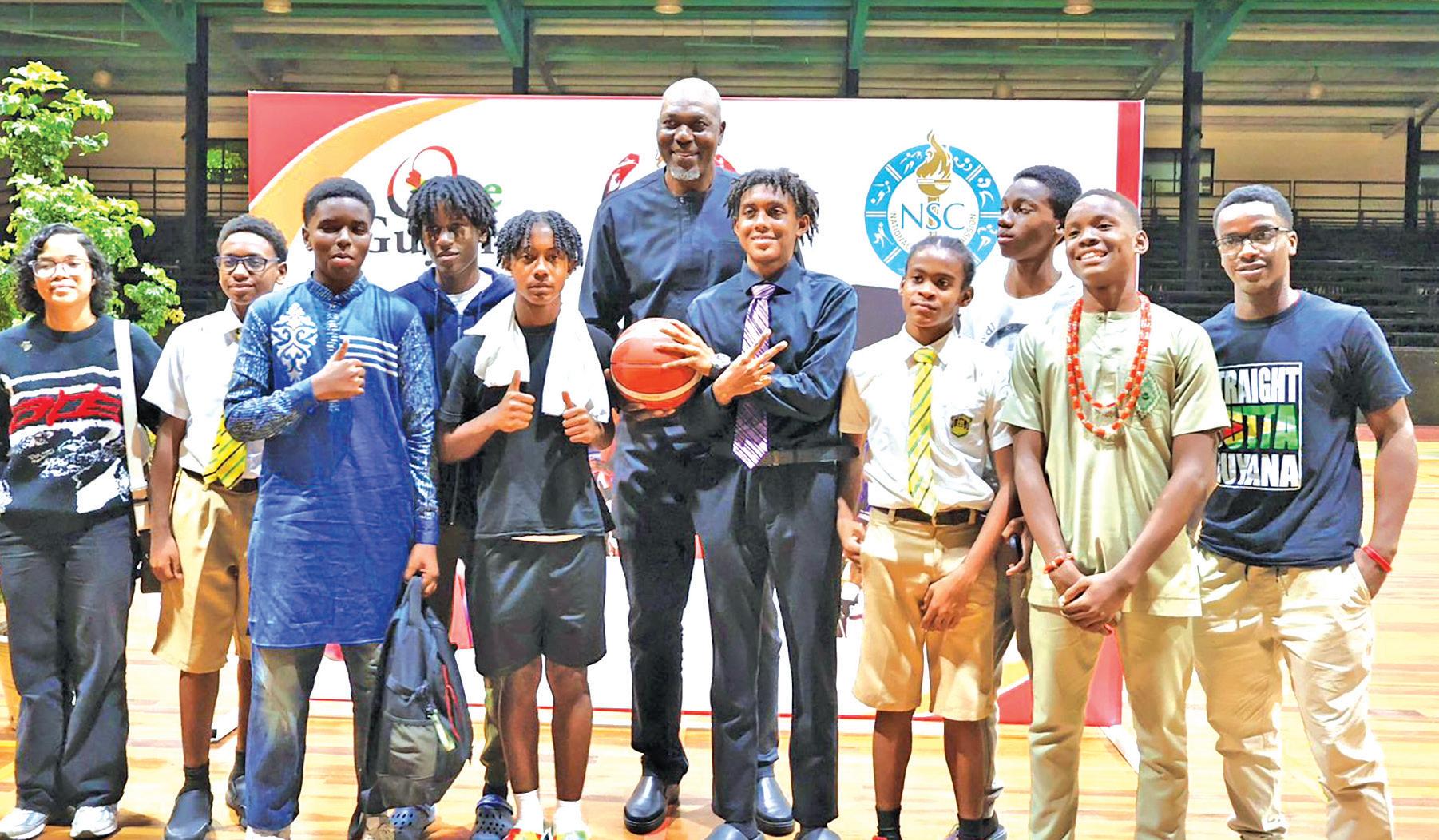






Over 12,000 more persons to receive money as Govt secures $3B in supplementary funds









$100K cash grant








Over 12,000 more persons to receive money as Govt secures $3B in supplementary funds









$100K cash grant
More than 12,000 additional Guyanese are expected to benefit from the government’s ongoing $100,000 per person cash grant initiative, as the administration moved to the National Assembly for an additional $3 billion in supplementary funding under Financial Paper No. 1 of 2025. This brings the total allocation for the program to $64 billion to date.
The announcement was made by Prime Minister Brigadier (Ret’d) Mark Phillips, who led the detailed breakdown during
the examination of the supplementary request on Friday in the National Assembly.
He disclosed that as of May 24, 2025, 617,398 Guyanese had been registered, with 602,927 cheques printed, and 578,182 already distributed; representing a 96 percent distribution rate.
The supplementary $3 billion request is based on the government’s forecast that approximately 12,100 more Guyanese are expected to register by mid-June 2025, bringing the projected total to 629,498 benefi-
ciaries.
“We expect an additional 12,100 more registrants by mid-June 2025… and therefore, we are making provision in the forecast,” Prime Minister Phillips explained, noting that the forecast was informed by the rate of ongoing registrations across the regions rather than the 2022 census or the electoral roll.
While the Prime Minister declined to provide a regional breakdown for the expected new registrants due to the fluid nature of the ongoing process, he emphasized that regis-
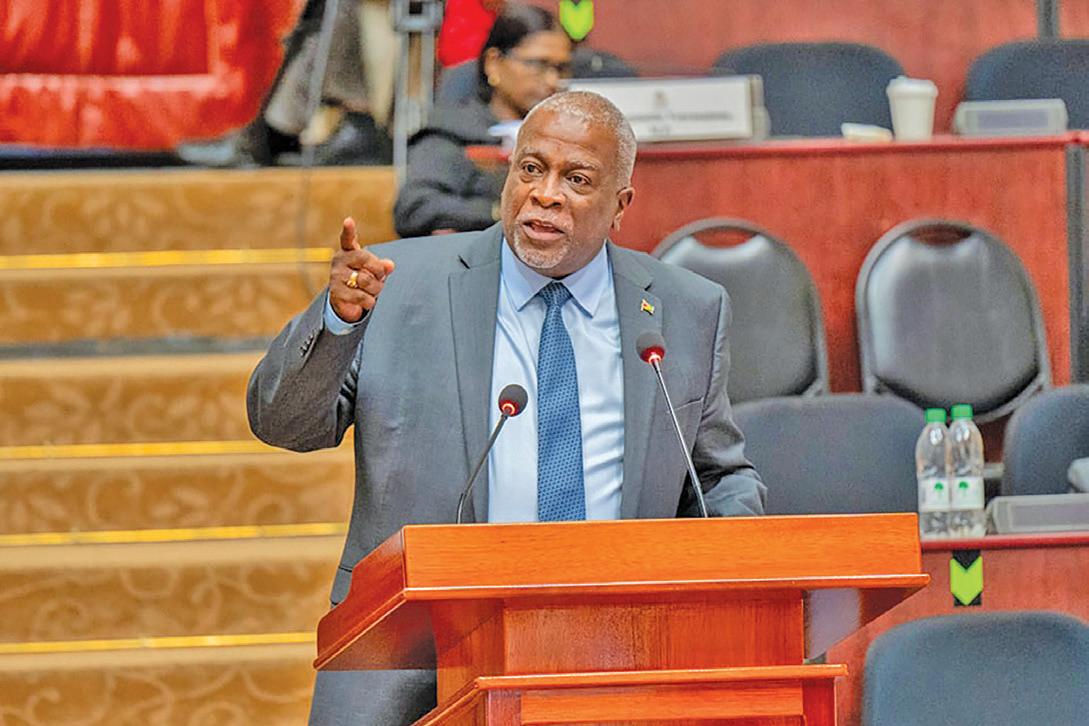
tration remains open at all Neighbourhood Democratic

Council (NDC) and Regional Democratic Council (RDC) offices, and that provisions are also in place to register shut-ins and the incapacitated.
Regional breakdown
As part of the government’s extensive $100,000 cash grant distribution effort, Prime Minister Brigadier (Ret’d) Mark Phillips disclosed detailed registration and cheque-printing statistics for each of Guyana’s 10 administrative regions during the National Assembly’s examination of Financial Paper No. 1 of 2025.
Region Four (DemeraraMahaica), Guyana’s most populous administrative division, recorded the highest number of registrants, with 274,957 persons signing up for the grant. Of that number, 268,271 cheques have already been printed, putting the region ahead in terms of processing and distribution. Region Three (Essequibo Islands-West Demerara) followed with 95,351 registered persons and 93,171 cheques printed, demonstrating similarly high progress in executing the program.
On the East BerbiceCorentyne corridor, Region Six saw 81,076 persons registered, with 78,829 cheques printed, while Region Five (Mahaica-Berbice) had 38,998 registrations and 38,132 cheques printed.
Region Two (PomeroonSupenaam), covering the Pomeroon-Supenaam area, reported 33,193 registered beneficiaries, with 32,273 cheques already prepared.
In the hinterland and interior regions, progress has also been significant.
Region One (Barima-Waini) had 20,811 persons registered, with 20,594 cheques printed. In Region Seven (Cuyuni-Mazaruni), 16,280 residents registered and 15,967 cheques were printed. Region Eight (PotaroSiparuni) saw 8,250 people come forward to register,
with 8,187 cheques printed, while Region Nine (Upper Takutu-Upper Essequibo) reported 18,667 registrants and 18,499 cheques printed.
Further, Region Ten (Upper Demerara-Berbice) which includes Linden and surrounding areas, registered 29,850 persons, and printed 29,004 cheques, rounding out a nationwide effort that has so far reached 617,398 people with 602,927 cheques printed.
According to the Prime Minister, of the $3 billion being sought, $2.65 billion will go toward additional grant payments for new registrants, $202.6 million is earmarked for cheque printing and $342.9 million is to cover administrative costs, including logistics, transportation, security, and meals for staff.
This follows the original budgetary allocations of $30.5 billion twice, totaling $61 billion, which covered the initial 600,000 registrants.
Clarity on administrative costs In response to persistent questions from Opposition Members of Parliament Ganesh Mahipaul and Volda Lawrence, the Prime Minister clarified that the $1 billion in administrative expenses associated with the earlier phases of the programme came from the Ministry of Finance and outside of the $60 billion initially approved. He also committed to laying over a regional breakdown of those administrative expenses upon request.
“All the monies are being accounted for… transparently,” the Prime Minister assured. “What is important is for every Guyanese to come and collect the money that is made available to them in this cash grant 2024-2025.”
Not a one-off payment
PM Phillips reiterated that this cash grant is not a one-off initiative, signalling that more cash transfers will be delivered in the future, as part of the government’s broader poverty alleviation and wealth redistribution efforts.
“We want every Guyanese to collect the money. It’s their money,” he affirmed.
The government continues to call on those who are eligible and have not yet registered to come forward before the end of June 2025, when the process is expected to conclude.



The Demerara Harbour Bridge will be closed to vehicular traffic on: Saturday, May 24 –01:55h-03:25h and Sunday, May 25 – 02:45h-04:15h.
The Berbice Bridge will be closed to vehicular traffic on: Saturday, May 24 – 14:20h-15:50h and Sunday, May 25 –15:15h-16:15h.


Parika and Supenaam departure times – 05:00h, 10:00h-12:00h, 16:00h, 18:30h daily.




Rain showers with instances of thunder are expected during the day and at night, with sunshine in the afternoon. Temperatures are expected to range between 23 degrees Celsius and 28 degrees Celsius.
Winds: Easterly to East North-Easterly between 2.68 metres and 4.02 metres.
High Tide: 14:28h reaching a maximum height of 2.59 metres.
Low Tide: 07:59h and 20:18h reaching minimum heights of 0.55 metre and 0.62 metre










“Guyana will not be bullied, threatened or intimidated” – Foreign Min …as National Assembly passes motion reaffirming Guyana’s sovereignty
In a resolute address to the National Assembly, Minister of Foreign Affairs and International Cooperation, Hugh Todd declared that Guyana will not be bullied, threatened, or intimidated into surrendering any part of its sovereign territory, as he tabled a motion reaffirming national unity and support for the government’s position on the ongoing border controversy with Venezuela.
The motion, presented and passed during the 104th Sitting of the Twelfth Parliament on Friday, seeks the legislature’s full endorsement of the government’s diplomatic and legal strategy at the International Court of Justice (ICJ), while strongly condemning Venezuela’s recent provocations, including its planned “elections” for the Essequibo region and its defiance of binding ICJ orders.
“While our intelligence is that there is currently no physical activity taking place in any of our communities close to the border, or suggests that there's any preparation for elections to be conducted in our Essequibo, it is important for Venezuela to understand that Guyana will not be bullied, threatened, or intimidated to surrender any portion of our patrimony,” Minister Todd assured.
The motion presented to the House asks the lawmakers to recall the motion passed on November 6, 2023, which reaffirmed the recognition of the 1899 Arbitral Award and the 1966 Geneva Agreement.
It also asks that the House “unequivocally reaffirms the sovereignty, territorial integrity, independence and indissolubility of the Co-operative Republic of Guyana
Strongly condemns the actions of the Government of Venezuela in defiance of the May 1, 2025 Order of the ICJ and views such actions as a violation of international law and a threat to regional peace and stability
Expresses its full support for the Government of Guyana in its efforts to protect and defend Guyana’s territorial integrity through peaceful and lawful means, including continued recourse to the International Court of Justice
Calls upon the international community to support Guyana in upholding the rule of law and the binding decisions of the International Court of Justice
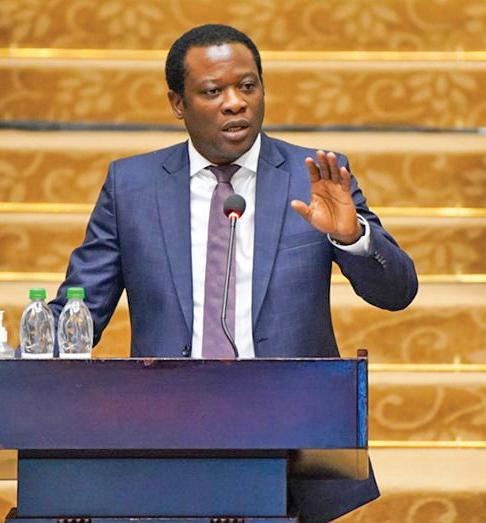
Directs those copies of this Resolution be transmitted to the Secretaries-General of the United Nations, the Commonwealth, the Organisation of American States, the Organisation of African, Caribbean and Pacific States, the Heads of State and Government of the Caribbean Community as well as other relevant international bodies.”
Todd traced Venezuela’s aggressive posturing and illegal claims to the 1899 Arbitral Award, which definitively settled the boundary but which Caracas has consistently rejected in violation of international law. He emphasized that Guyana, in stark contrast, has consistently taken the high ground, opting for diplo-
macy and the rule of law.
“We remain committed to international law and the peaceful resolution of this matter through the international court process and we call upon Venezuela to comply with the court's legally binding orders and to refrain from actions that would destabilize this region and violate Guyana's territorial integrity. Mr. Speaker, today's motion is not merely symbolic. It is a reformation of the will of the Guyanese people,” Todd added.
The Government has reiterated its commitment to safeguarding Guyana’s territorial integrity and sovereignty, while also seeking accountability through diplomatic channels.
Earlier this month,
President Dr. Irfaan Ali had reaffirmed that the GDF is mobilised and prepared to defend the nation’s sovereignty and territorial integrity amid ongoing tensions with Venezuela.
The Head of State emphasised that security operations are actively underway, particularly in light of Venezuela’s upcoming unlawful elections and continued claims over Guyana’s Essequibo region — claims which Guyana has consistently rejected and challenged through international legal avenues.
After years of failed good offices process through the UN, and based on the recommendation of the-then UN Secretary General, Guyana approached the World Court in March 2018, seeking a final and binding settlement of the 1899 Arbitral Award, which determined the land boundary between Guyana and Venezuela.
The case is currently pending before the ICJ, which has already established its jurisdiction to hear the matter. Guyana has already filed two written pleadings on the merits, and Venezuela has filed one, with its second pleading due in August 2025. Oral hearings are expected in the first half of 2026, following which the Court will deliberate on the case and issue its final judgment on the Merits, which will be binding on the parties.



Editor: Tusika Martin
News Hotline: 231-8063 Editorial: 231-0544, 223-7230, 223-7231, 225-7761
Marketing: 231-8064Accounts: 225-6707
Mailing address: Queens Atlantic Industrial Estate Industrial Site, Ruimveldt, Georgetown
Email: news@guyanatimesgy.com, marketing@guyanatimesgy.com
The announcement by the Labour Ministry to dispatch legal professionals into Indigenous and hinterland communities represents a necessary and commendable step towards addressing a longstanding and deeply entrenched issue – labour exploitation in the hinterland regions of Guyana. The initiative, unveiled during the National Toshaos Council Conference, targets a critical gap in knowledge that continues to leave Indigenous workers vulnerable to abuse by unscrupulous contractors, particularly in the mining and logging sectors.
For decades, hinterland workers have operated in a legal grey area, often engaging in informal employment arrangements with little to no understanding of their rights or the obligations of their employers. These workers are frequently subjected to non-payment or underpayment of wages and are unable to seek legal redress due to the absence of formal contracts or documented agreements. The issue is compounded by the remoteness of many communities and the lack of access to legal resources and education.
The Government’s decision to equip Toshaos and community councillors with crash courses in basic contract law and workers’ rights is both strategic and empowering. By enabling local leaders to serve as first responders in labour disputes and contract negotiations, the Government is decentralising legal knowledge and embedding it directly within communities most at risk. This approach not only fosters self-reliance but also strengthens the capacity of Indigenous leaders to advocate for fair and just treatment of their residents.
The practical examples shared during the conference highlight the urgency of this initiative. Instances where workers are unaware of the names or business locations of their employers are not just anecdotes – they are stark illustrations of systemic neglect and the absence of oversight in these employment arrangements. In one reported case, workers could only identify their employer by a nickname, rendering the Ministry powerless to trace the individual or enforce any legal obligations. Such situations not only deprive workers of their wages but also deny them the dignity and protection that every citizen is entitled to under the law.
Further, the inability to pursue legal action due to the lack of documented agreements illustrates a critical flaw in how employment is structured in hinterland regions. The reliance on verbal promises, which are inherently unenforceable in court, leaves workers without a safety net. The Ministry’s move to promote written contracts, even in the simplest form, is an essential remedy to this problem. These documents serve as evidence in disputes and offer a foundational layer of security for workers entering into employment relationships.
As was stated at the NTC, the Labour Ministry already possesses the human resources necessary to implement this educational drive. The availability of legal officers, including the Chief Labour Officer, underscores the feasibility of the plan and suggests that it can be rolled out with minimal bureaucratic delay. The success of the programme, however, will depend on sustained engagement with communities, culturally-sensitive training methods, and continuous followup to ensure the knowledge imparted is being applied effectively.
Crucially, this initiative must be viewed not in isolation but as part of a broader strategy to uplift hinterland communities through legal inclusion and economic empowerment. Workers’ rights education must go hand-in-hand with other development goals, such as improving access to education, health care, and infrastructure. A well-informed workforce is not only less susceptible to exploitation but also better positioned to contribute to and benefit from economic activities in a sustainable and equitable manner.
This initiative should be met with robust support and vigilant oversight. The measure of its success will lie not only in the number of workshops conducted or contracts signed, but in the long-term empowerment of hinterland workers to assert their rights and demand fair treatment.


By Larry ELLiott
Ask any one of the 187 female Labour MPs whether they would have made it to the House of Commons without an education and you would probably get short shrift. Most would wax lyrical about their school days and the teachers who taught and inspired them.
Yet the Government of which those women make up almost half the total number of MPs is now targeting spending on “education and gender” for cuts in the overseas aid budget. It is beyond depressing.
Jenny Chapman, the international development minister, could not have been clearer when giving evidence to a select committee last week. The decision to reduce aid spending from 0.5 per cent to 0.3 per cent of national income by 2027 meant something had to give, and that was money that had hitherto been spent not just on building schools in poor countries but also encouraging girls to attend them. In a more challenging spending environment, the United Kingdom will now make health its priority.
Make no mistake, Chapman faces some unenviable choices. There is no soft landing when you have to implement a 40 per cent cut in your budget. But a slash-and-burn approach to education is indefensible and would have been anathema to previous Labour Governments.
Things were certainly different 20 years ago, when the final preparations for a G8 summit at Gleneagles involved the Prime Minister, Tony Blair,
and the Chancellor, Gordon Brown, successfully lobbying fellow world leaders for a US$50 billion aid package and a comprehensive debt relief deal.
Times are tougher now. At the time of Gleneagles, the global economy was booming and Government finances were healthy. The global financial crisis was still two years away, and only the most inveterate pessimists foresaw the age of austerity that would follow the near collapse of the banks.
In 2005, the rich countries of the West were minded to be generous. Today they are not, and it is naive to imagine that the aid budget is going to remain sacrosanct when the British Government is planning cuts to disability benefits.
All that said, cutting aid spending on education for girls is still a bad policy choice. Before it was axed as a standalone ministry by the Conservatives and subsumed into the Foreign Office, the Department for International Development commissioned countless studies into whether spending money on encouraging girls to go to school should be a priority for the aid budget. It concluded that it should be – and for good reasons.
Women with an education are far more likely to go to a clinic and have their children vaccinated. They are also more likely to get antenatal care and seek early treatment for diarrhoea and pneumonia, both potential killers.
The evidence is compelling: if all women completed primary education and gained basic literacy, mater-
nal deaths would be reduced by two-thirds. In Malawi, each additional year of maternal education cut infant mortality by 10 per cent. In Uganda, each extra year of schooling cut the risk of infant mortality by more than 16 per cent. Chapman seems not to get the point that cutting education spending will reduce the effectiveness of spending on health.
In 1996, the year before he became Prime Minister, Blair said the three priorities for a Labour government would be “education, education, education”, and the reason he said that was because investment in education is good for growth and boosts living standards. That applies even more to poor countries than it does to rich countries. In a low-income nation, every year of schooling results in a 10 per cent increase in earnings.
Nor is investing in education costly. One study has found that US$100 (£75) pays for the equivalent of two extra years of teaching for girls. With the Government keen to ensure that every penny of a reduced aid budget is used effectively, that represents excellent value for money.
Ministers of all parties once accepted all these arguments as a matter of course. This, for example, was Alok Sharma, Boris Johnson’s international development secretary, back in 2019: “Educating girls prevents child marriage and early pregnancy, helps women into the workforce and boosts household incomes and economic growth. Supporting education for girls and women gives them a greater voice. That voice
helps them to shape their own future and advocate for changes in their own lives and, very importantly, the lives of other girls and women.”
All of which remains as true now as it was then. Education is worthwhile not just because of the quantifiable economic benefits – important though they are –but because of the spin-offs it generates. The economist Amartya Sen has pointed out these intangible gains – confidence, ability to engage in political processes, capacity for absorbing and processing information –that create opportunities. In countries where gender equity is deeply entrenched in homes and labour markets, education is a gamechanger. If, as Chapman says, a reduced aid budget is the “new normal”, there are ways of mitigating the pain. The Government could alter the balance so that more British spending goes through multilateral organisations, such as the World Bank, which have the financial firepower to make pooled resources go further. It could press harder for a comprehensive debt relief agreement that would allow poor countries to devote more of their spending to education. But that has to start with a different approach. This is not just about the money; it is also about a mindset that appears to have forgotten that encouraging girls to go to school is good for health, good for growth, good for poverty reduction, good for gender equality and good for the self-esteem of women. (The Guardian) (Larry Elliott is a Guardian columnist)
Dear Editor,
The idiom “Putting your foot in your mouth,” aptly describes the overall behavioural pattern of the PNC/APNU party. It is a party that makes claims or remarks that are remarkably strange, unusual or bizarre, often exceeding what is considered reasonable or expected. And when cornered with the veracity of those very same statements, they turn again and deny it. History is replete with such outlandish behaviours.
Let us take the statement in context, “The Police and The Army are my Kith and Kin,” those were the words splashed across the airwaves by The PNC Leader Desmond Hoyte himself. He also said “I will make Guyana
ungovernable,” these are serious statements that were meant to create chaos and instability in our society. Calling The GPF Kith and Kin shows total trust and confidence in the police; a long-held “family relation” between the two entities, that is, a close union between a political party and an organisation that is statutorily bound by Law to be separate and distinct from Government control. But this is the way things were mandated in this country. It was so conspicuously obvious, that the police was an organ of the PNC. Thus, it was an unconstitutional association, when the interests of a political party cross lines to take over that of the legal responsibility of a statuto -
ry body, this spells trouble right from the very start. What is supposed to be a separate statutory body, has become one that is now mixing and moiling together with the manipulative shenanigans of a political party; this was the order of the day as The PNC reigned supreme over the police.
This untenable situation saw The Police being engaged in illegal activities such as the hunting down of political opponents and bringing persons in on trumped up charges; The Police were the “Tonton Macoutes” of The PNC party. Fast forward to 2020 and the five months of waiting for electoral results, here the police were directed to spy on the local and foreign
observers and rudely eject persons who did not give assent to the rigging taking place there. Those officers who did not comply with directives from Congress Place, were fired from the job.
In The PNC’s Book being a “Competent Police Force” meant that The GPF was obligated to turn a blind eye to the hooligans who were looting, burning and raping in Regent Street during Hoyte’s “Slow fire moh fire.” In just the same way when The Adrianna case surfaced, I am talking about the burning, the looting and millions of dollars in damage caused by the rampaging mob. In all of this this the police was mandated to do nothing, just give the mob a free
pass; this is what they would consider “good policing.”
Now, the blatant attack on the police that they are incompetent and they lack the ability to carry out a thorough investigation, comes from the reality that the police is no longer under the control of the PNC. In a related matter, as it applies to The Adrianna case, I would advocate that the GPF videotape persons coming in to make a report, it will go a far way in equipping the police with verifiable proof of one’s own statements and comments. It will also help to remove some of the lies and misconceptions of the police, as well as bolster the investigative capabilities of the force.
It has been report-
ed that the PPP/C is distancing itself from the police claiming that it is separate and distinctly a statutory body, and one that is expected to function in that capacity. And I will endorse that fact, that Law Enforcement ought to be separate from Government and party. In this regard, you will never hear such endearments coming from the PPP/C that The Police are Kith and Kin, what you are sure to hear is that the police are on their way to becoming a modern force, equipped to carry out its mandate to protect and serve. I rest my case.
Respectfully,
Neil Adams
Dear Editor,
The Ethnic Relations Commission (ERC) wishes to provide an update on two ongoing matters involving religiously insensitive content in separate songs by the artistes Vybz Kartel and Baby Skello, which have been deemed offensive to the Christian and Hindu communities, respectively Ahead of the scheduled performance of Jamaican artiste Vybz Kartel in Guyana on May 24, 2025 the Commission formally wrote to the event organisers, Hits and
Jams Entertainment, requesting to meet on the matter. Regrettably, as of the date of this statement, the ERC has not received any response from Hits and Jams regarding this request. In addition, the ERC has written to the Guyana National Broadcasting Authority (GNBA) referencing provisions under the Broadcasting Act. The Commission urged the GNBA to prohibit the broadcast of the song ‘Good Like Jesus’ by Vybz Kartel across radio and
television platforms due to its offensive and divisive nature. Furthermore, the ERC calls on Vybz Kartel to issue a public apology to the people of Guyana, particularly the Christian community, for the offensive and insensitive content contained in the referenced song. The Commission also takes this opportunity to correct inaccurate media reports which suggested that the ERC was responsible for the arrest of Mr Daniel Wharton, also known by his stage name
Baby Skello. The ERC wishes to inform the public that a letter was dispatched to Mr Wharton, requesting his presence at the Commission in relation to a song released by him that has raised public concern over its derogatory content. To date, Mr Wharton has not made contact with the Commission. The ERC reiterates its call for Mr Wharton ‘Baby Skello’ to come forward and make contact with the Commission urgently to address this important matter. The Commission
Dear Editor,
Today, the people of Guyana bore witness to an act of staggering political irresponsibility, clothed in petty grievance and devoid of patriotism. At a time when our nation’s sovereignty is under direct threat by a belligerent neighbour, the Honourable Leader of the Opposition, Mr Aubrey Norton, chose to abandon his duty and walk out of the National Assembly, as the Government of Guyana tabled a critical motion to denounce Venezuela’s ongoing violations of international law. This motion, grounded in Guyana’s unwavering support for the International Court of Justice and our collective defence of the Essequibo region, integral to our territorial integrity, was an opportunity for unity, not division. Mr Norton’s decision to politicise this solemn moment by staging a walkout over a procedural committee matter is frankly, contemptible. Let it be clear: the chairmanship
of the Foreign Relations Committee is no justification for betraying the sacred responsibility of elected office at such a perilous time for our Republic. When the flag is under siege, when the courts of the world stand with Guyana, and when our people need reassurance that their leaders will stand firm and united, Mr Norton chose instead to grandstand. His actions today were not those of a statesman, but of a saboteur. The Liberty and Justice Party condemns, in the strongest possible terms this disgraceful display of political vanity over national duty. This is not opposition; it is abdication. It is not patriotism; it is perfidy. In walking out of Parliament, Mr Norton walked out on every Guyanese man, woman, and child whose future is tied to the peace, security, and sovereignty of our homeland. We call on all right-thinking Guyanese to see this act for what it is: a betrayal of our Republic at its moment
of need. We urge the Leader of the Opposition to abandon this dangerous political theatre and return to the only stage that matters now, the collective defence of our nation. Let us not be distracted. Let us not be divided. Let
us be Guyanese—first, last, and always.
Sincerely, Lenox Shuman Leader, Liberty and Justice Party

notes with deep disappointment, the increase in religiously and ethnically insensitive content being produced and disseminated. Therefore, the ERC calls on all stakeholders to think and act more responsibly in the generation of content that is circulated in our plural society. The ERC remains committed to its constitutional mandate of promoting harmony and mutual
respect among all ethnic groups in Guyana. The Commission continues to urge all stakeholders, including entertainers and broadcasters, to act responsibly and with consideration for Guyana’s rich ethnic diversity and commitment to national unity.
Sincerely, Ethnic Relations Commission

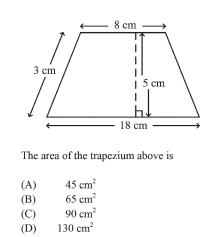
















Prime Minister Brigadier (Ret’d)
Mark Phillips on Friday issued a blistering rebuke of the Opposition’s refusal to support a landmark motion reaffirming Guyana’s sovereignty over the Essequibo region, calling their walkout from the National Assembly “shameful” and “unpatriotic.”
The motion, tabled by Foreign Affairs Minister Hugh Todd, sought to reaffirm Guyana’s sovereignty, territorial integrity, and support for the ongoing case before the International Court of Justice (ICJ), while condemning Venezuela’s planned “elections” in the Essequibo and its defiance of binding ICJ orders.
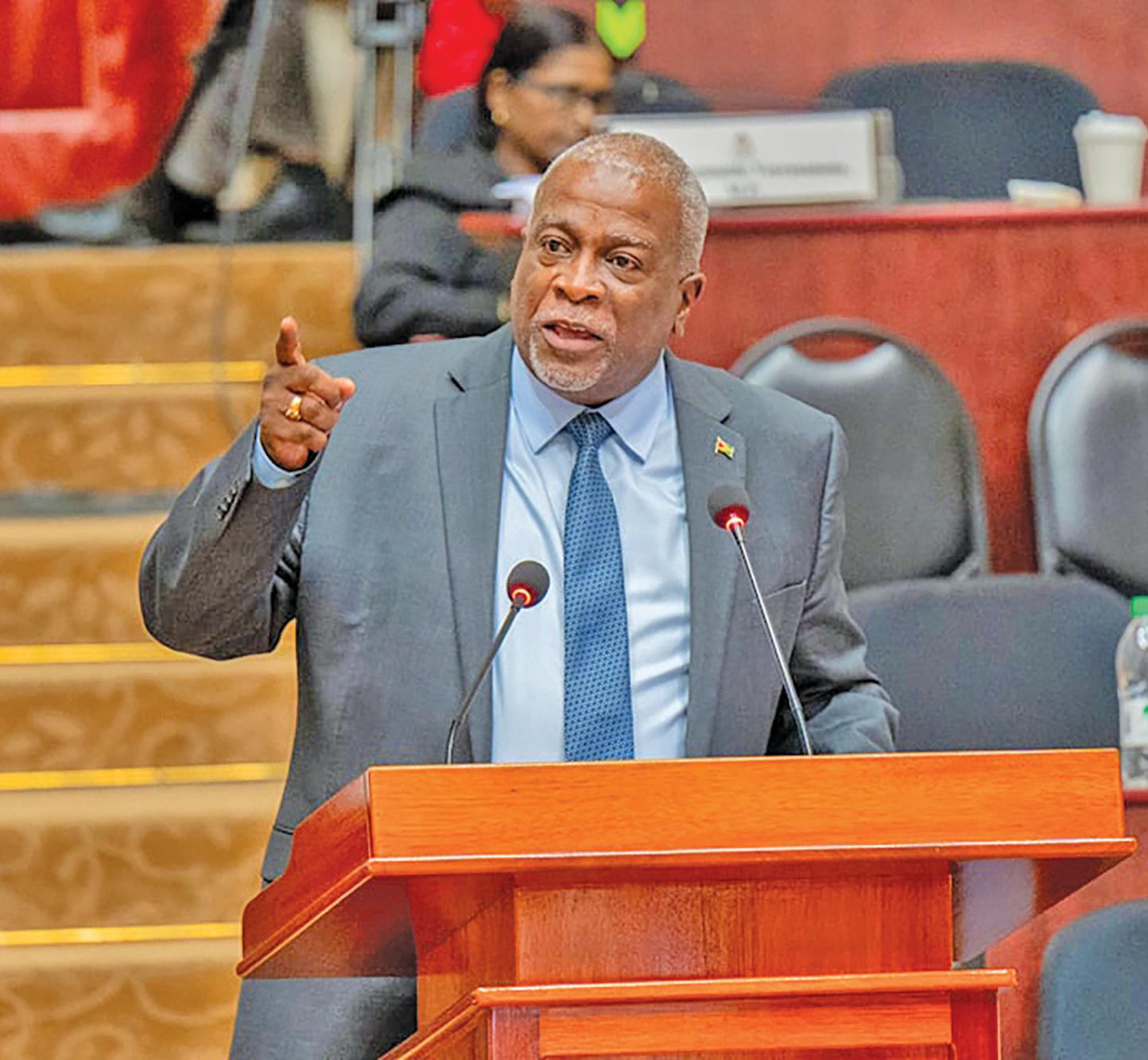
However, Opposition Leader Aubrey Norton and members of the APNU+AFC coalition walked out of the debate, refusing to support the motion, which they claimed lacked enforceability.
Reacting strongly, the Prime Minister said, “A house divided cannot stand,” warning that such division at a time of national significance only weakens the country’s position. “The only people who seem to have a difference and are unpatriotic are the leader of the Opposition and perhaps those who are following him. And they will be left behind,” Phillips said. He noted that Guyanese

Ahouse located in Gibraltar Village, Region Six, was completely destroyed by fire on Thursday night.
The building was owned by 51-year-old Junior Jonas, a government parttime worker attached to the Fyrish-Gibraltar Neighbourhood Democratic Council (NDC).
Jonas occupied the upper flat of the two-storey wooden house at Lot 155, Gibraltar Village, Corentyne, Region Six (East BerbiceCorentyne).
The upper flat had two bedrooms. Jonas’s nephew-in-law lived in the lower flat, which also had two bedrooms.
Lotoya Griffith who occupied the lower flat with her husband and three children, said they were in the process of removing to a new building which was constructed on the same property.
According to her, the moving process commenced last week, and she and her children had been sleeping in the new building with her mother. She said that on Thursday night, her mother asked about a fire in the yard.
“My mommy, she sleep late. So, when she probably get up she saw the brightness and asked, ‘Who light fire in the yard this hour?’ When she decide to get up and drink some water, then she see the big blaze over by the tank, and say, ‘Fire!, Fire!’”.
The health centre worker said at the time, her children were asleep.
“I get up and wake them up and we run out. We go to come to the front but the heat was too much. We had to run around the back of the house and go over to the next neighbour. And then people start come to render assistance,” she recalled.
The Rose Town Fire Station was contacted, and firefighters were able to contain the fire from spreading to two other buildings on the premises.
According to Griffith, her husband who was not at home at the time, was still solely occupying the building which was burnt.
“We still had stuff in the house, like chairs, bed, gas bottle, mattress, TV… Like...household thing, every household thing and –my uncle – he had tools.”
from all walks of life, especially children in schools, have shown far more patriotism and national pride than those elected to represent them. “Our children know better than those who are paid to keep the government on its toes,” Phillips added, pointing out that the people of Guyana, at home and abroad, remain united on the issue.
Additionally, the Prime Minister accused Norton of attempting to rewrite history by invoking the Geneva Agreement signed under Forbes Burnham, without acknowledging that it was done without consultation. He reminded the House that Guyana was only returned to democracy in 1992 after 28 years of undemocratic Peoples National Congress (PNC) rule. “Those who forget the past are condemned to repeat it,” Phillips stated.
Highlighting the collaborative approach taken by the government, Phillips explained that a draft of the motion had been shared with the Opposition’s Chief Whip to allow input, amendments, and support—but no such collaboration came. “In the House today, the Leader of the Opposition said he didn’t see the draft motion—yet, a full diatribe was posted on social media,” he said, calling it a
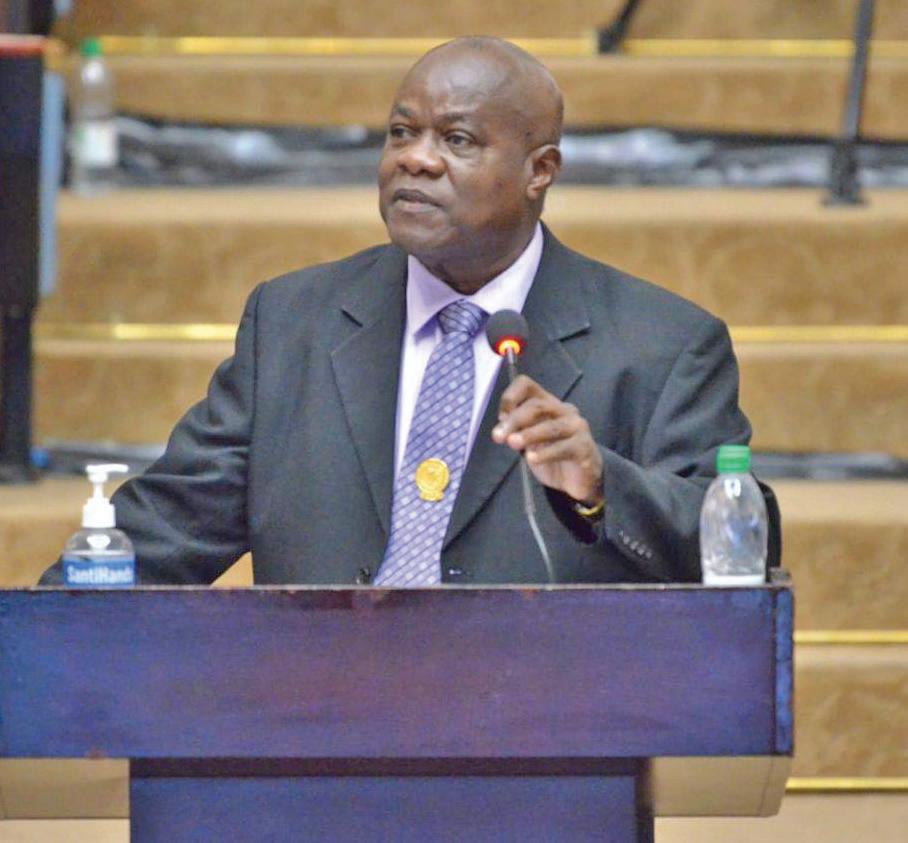
clear attempt at political showmanship.
The Prime Minister also used the opportunity to underscore the strength of Guyana’s defence capabilities, especially the revitalization of the Guyana National Reserve. “Every citizen is allowed to be a soldier… and the National Reserve is as strong as it has ever been,” he asserted.
She said the house needed repairs so she was moving to the back house to allow her uncle to have full access to the building.
Junior Jonas, her uncle, said he had not been staying at the building at the time, and was at his-mother-inlaw’s home for a few days.
At the time of the fire he was on the road a short distance away. He said someone told him about the fire and by the time he got there the firefighters were already in operation.
He said he last visited the premises last week as he was staying with his partner. His house, he said, was fully furnished.
“I glad for assistance to rebuild. I used to cut cane [but] done the cane work because of sickness,” he said.
“I feel bad losing everything to the fire, because things expensive now...” he disclosed.
Earlier this week an another government 10-day part time worker attached to the Fyrish-Gibraltar NDC lost her home to fire.
Jonas can be contacted by telephone numbers 3220941 or 692-9539 for assistance.
He further pointed out that the public relations campaign around the border controversy has raised awareness like never before. “Today in Guyana, every Guyanese is better informed about the Guyana-Venezuela controversy than ever before. Perhaps even more so than the Opposition,” he jabbed. The Opposition’s refusal to participate in upcoming national events, including Flag Day and the 59th Independence Anniversary celebrations, was also criticized. “They were asked to get on board and refused,” Phillips said. “This is the same Opposition that attempted to cling to power in 2020, even after a recount and international verification. They live in an alternate universe.”
Calling the motion a reaffirmation of the will of the Guyanese people, Phillips declared, “When our sovereignty was challenged, our unity stood firm. Let the world see Guyana united—despite those who try to divide us.”


Four men were arrested Tuesday night, after police discovered more than 60 grams of suspected cocaine and cannabis near the Farmer’s Wharf at the Supernaam waterfront in Essequibo.
According to reports, police ranks of Regional Division #2 were on mobile patrol around 23:17h when they observed the men near ‘Dunchie’s Shop’. A search of the area led to the discovery of a transparent plastic bag containing a white, rocklike substance suspected to be cocaine, and another bag with leaves, seeds, and stems believed to be cannabis. The bags were found a short distance away in front of the wharf.
The four men, who were in close proximity to the discovery site, were shown the narcotics but denied any knowledge or ownership.
They were promptly tak-

en into custody and transported to the Aurora Police Station. The suspected cocaine weighed 51.98 grams, while the cannabis weighed 12.25 grams.
Investigations into the discovery and the men’s connection to the drugs are ongoing.
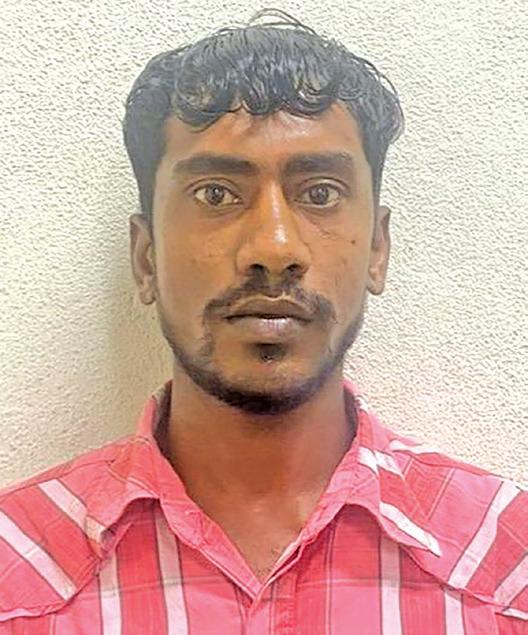
Two men from the East Coast of Demerara appeared in separate courts this week to answer separate criminal charges involving armed robbery and the illegal discharge of a loaded firearm.
While one matter was dismissed following the victim’s refusal to testify, the other resulted in bail being granted.

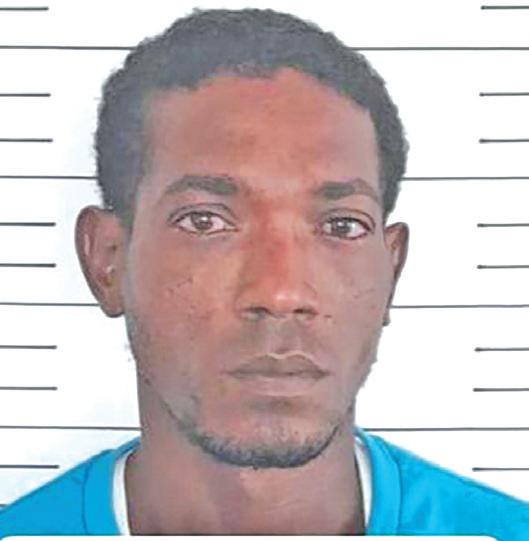
In the first case, Marlon Singh, a 27-yearold construction worker of Vryheid’s Lust, was brought before the Sparendaam Magistrate’s Courts on Thursday, after being arrested on May 18.
Singh was charged with Robbery Under Arms, contrary to Section 222 (c) of the Criminal Law (Offences) Act, Chapter 8:01.
Police alleged that Singh robbed Rohit Kawall on the same date of $40,000 in cash and a Samsung A03 mobile phone valued at $40,000. The incident reportedly took place at Montrose, East Coast Demerara.
Singh appeared before Magistrate Abigail Gibbs where the charge was formally read, and he entered a not guilty plea.
However, Kawall opted not to offer any evidence against the accused, resulting in the dismissal of the case.
In a separate courtroom, this time at the Vigilance Magistrate’s Court, 31-year-old fisherman Jason Gordon of Unity Lancaster, faced charges stemming from an incident that occurred on May 20, 2025.
Gordon was arrested and charged with Discharging a Loaded Firearm with Intent, in violation of Section 55 (a) of the Criminal Law (Offences) Act, Chapter 8:01.
The charge was in relation to an alleged attack on Police Corporal Jermaine Elcock, who is stationed at the Mahaica Police Station.
Gordon appeared before Senior Magistrate Sunil Scarce, where he pleaded not guilty to the offence. He was granted $150,000 bail.
Gordon also faced a second charge, Discharging a Loaded Firearm Within One Hundred Yards of a Public Way, contrary to Section 153 (i)(iii) of the same Act. He again pleaded not guilty and was placed on an additional $25,000 bail.
Both matters involving Gordon have been adjourned to June 26 for report.

Venezuela represents a clear and present danger to our survival as a state and a nation and should be seen as an existential threat to our individual peace of mind. But somehow there are folks who don’t just appreciate this as part of their responsibility as Guyanese citizens – but actually work against our national interests. Such people must be identified and called out for what they are – TRAITORS!!
Unfortunately, we only “pick up” when we’re personally challenged and ignore affronts that should make us defend the national interests. Yet sadly, we should be among the most conscious in the world of the need to identify our nation’s interests as coterminous with our personal ones!! Why? Well, we were ruled by a nation that could boasted of an empire on which the “sun never sets” – largely because they were willing to live and die for their country. Remember “The Charge of the Light Brigade” where one of their battalions rode into the jaws of death – even though they knew they were gonna perish?? They might’ve lost that battle and lives, but Britain won the war – and so many other wars.
So, coming back to our national threat from Venezuela imagine your Eyewitness’s outrage when he heard some businessman named Randy Jagdeo – was actually pushing support for Maduro’s elections-in-Essequibo gambit!! This wasn’t just being passive in the face of Mad Maduro’s machinations but actually supporting the enemy in one of the most insidious ploys – “electing” persons to “represent” Essequibo!! This is treason – and such traitors must be dealt with condignly!!
In the modern world after WWII, we have the paradigmatic case of how to deal with traitors in the case of one Vidkun Quisling from Norway – even then, one of the most humane countries in the world. During the war the Nazis invaded and occupied Norway and Quisling – who was a political leader –headed a domestic Nazi collaborationist regime that fawned over the Nazis!! After the war, Quisling was charged with treason and argued that he acted in Norway’s best interest with the goal of restoring Norwegian independence. The court was unconvinced, however, and Quisling was convicted and sentenced to death. He was executed by a firing squad on October 24, 1945!!
The name “Quisling” has now entered the English language to mean a citizen or politician of a country who collaborates with an enemy occupying force or more generally as a synonym for traitor or collaborator!! This Randy Jagdeo fellow must be called out for what he is – a Quisling to our dear land of Guyana. Well, good for us, the authorities have acted expeditiously and charged him for inciting persons to commit treason!!
Let’s make this Quisling an example to other Mad Maduro’s local supporters!!
…Indigenous independence
Well, with Independence Day coming up, the PPP Govt has been adding to the slew of programmes that’ve unfurled to make our Indigenous Peoples – who once owned 100% of Guyana! – actually experience what it means to be independent!! When the PNC-UF coalition was granted control of an independent Guyana, they were mandated – as part of the Independence agreement – to give legal title to all the lands the Indigenous Peoples occupied. But that remained only on paper – until the PPP made it reality!! In addition, the PPP has created schools, homes, roads, jobs, solar power generating electricity and internet connections, etc, in the far-flung interior to bring our Indigenous Peoples’ living conditions up to par with the coastlanders!! They’re already ahead of the latter because funds earned for preserving our forests all go directly towards their development!!
Now a new initiative is being considered – possibly issuing gold mining licences to exploit the wealth under the land they own!!
Most folks don’t realise Indigenous Peoples never had such rights!!
…T&T’s new poverty
Imagine the Indian Government just donated 19,000 kgs of rice and 12,500 litres of edible oil to T&T – just ahead of their Indian Arrival Day on May 30.
A cautionary tale for investing oil money wisely!!


...over 18,000
Astate-of-the-art water treatment plant has been officially commissioned at Onderneeming Sand Pit in Region Two (Pomeroon-Supenaam), bringing clean, treated water to over 18000 residents.
The newly commissioned Onderneeming Water Treatment Plant was constructed by Toshiba Water Solutions Inc. at a tune of $1.2 billion dollars. The facility has the capacity to treat 10 million litres of water per day (MLD) and includes 35 km of transmission mains.
The commissioning was led by His Excellency Dr. Mohamed Irfaan Ali, who was joined by several top officials including Guyana Water Inc. (GWI) CEO Shaik Baksh, Communications Manager Travis Bruce, President of Toshiba Water Solutions America Inc. (Caribbean Region) Raj Kumar Kushwaha, Chairman of the Board Ramesh Dookhoo, and Regional Chairperson Vilma De Silva, among others.
Addressing residents and stakeholders at the ceremony, President Ali emphasized that the new facility is more than just a piece of infrastructure—it is a symbol of government’s belief in its people, and a manifestation of the investment in their dignity and honour.
He described water and its quality as an essential part of community development, and highlighted that the journey toward building a modern economy is one that focuses not only on numbers and growth, but on uplifting the lives of people in every community and region across Guyana.
President Ali stressed that true progress cannot be measured solely by developments in Georgetown, but by the extent to which even the most remote and underserved communities benefit. Whether in the coastland, the hinterland, or riverine island communities, real development must be felt by all.
President Ali also stated that improving water systems, roads, healthcare, and education are all part of a broader mission to eliminate geography as a barrier to opportunity. He reaffirmed the government’s commitment to ensuring that no Guyanese is left behind, and that every citizen enjoys the benefits of national development.
He highlighted that this current stage of development is not the product of oil discoveries alone. Instead, it stems from a vision birthed in the 1990s, when many communities had no reliable access to water.
“It began in the 1990s when many communities had no access to reliable water supply, when many of our families, particularly in rural and hinterland communities, had to fetch water from trenches, creeks or buy it at great cost. It was in those days that a vision was born, a vision to bring water to every home in this country, not

as a luxury, but as a right, a fundamental right. And it is that vision that we are honouring and fulfilling here today.” His Excellency noted.
The commissioning of the Onderneeming plant, he said, is the fulfilment of that long-standing vision— made possible through the efforts of successive People’s Progressive Party/Civic governments and the relentless work of countless individuals who have driven development in Region Two and across the country.
He went on to underscore the foundation of a modern Guyana as one built on robust social services including healthcare, education, housing, roads, and critically, access to clean water. He added that a country cannot call itself modern or prosperous if its people do not have access to such basic human necessities.
Further elaborating, President Ali explained that the government is not merely aiming for better water pressure or broader access— they are delivering water that is safe, clear, and drinkable. Water that transforms health outcomes and meets international standards set by the World Health Organization.
He acknowledged the inconvenience and health concerns caused by discoloured and iron-laden water, often identified by its reddish hue and metallic taste, and declared that such conditions must become a thing of the past. The government, he said, is investing heavily to ensure this transformation becomes reality.
Project Overview
The newly constructed treatment plant now serves over 18,000 residents across numerous villages, including Supenaam, Good Hope, Spring Garden, Good Intent, Aurora, Makeshift, Dryshore/Warousie, Hibernia, Fairfield, Vilvorden, Middlesex, Huis T’Dieren, Pomona, Riverstown, Airy Hall, Adventure, Red Village, Suddie, Maria’s Lodge, Johanna Cecilia, Land of Plenty, Three Friends, Columbia, and Affiance.
The transmission component was awarded in three lots, at a total cost of GYD $900 million to International Import and Supplies,

Mohamed Ramzanali Construction, and NK Engineering Services. Two new wells were also drilled on-site by Morris Jeffrey and GWI’s Well Services team to supply the plant.
The facility is part of the wider Coastal Water Treatment Infrastructure Programme (CWTIP), a $40 billion GYD initiative by the Government of Guyana aimed at increasing treated water coverage along the
coast to 90% by 2025.
GWI has completed seven large treatment plants, upgraded twelve others, and installed 200 km of transmission mains to improve water quality, continuity, and service levels in Regions 2, 3, 4, 5, and 6. Eighteen additional small treatment plants are under construction. Residents are being encouraged to use the improved water supply responsibly and to report any leaks or faults on service connections or water mains to GWI for immediate attention.



Legal Affairs Minister Anil Nandlall has reaffirmed that the benefits entitled to Indigenous peoples in Guyana are a direct result of the progressive work of the PPP/C government to safeguard their rights.
While highlighting the benefits afforded to Amerindians in Guyana, Nandlall stated that the state can implement various measures in their favour — a significant privilege that no other ethnic group in Guyana enjoys. These measures, he said, ultimately benefit the Amerindian community. He made these statements during the recent National Toshaos Council (NTC) Conference.
“Now, in that provision in the Constitution, the state is prohibited from passing any law, implementing any policy, or taking any action that will be discriminatory against any citizen or any class of citizens. So, if the state were to pass a law that discriminates against any individual, group of individuals, or ethnic group, that law would be unlawful — it would be uncon-

stitutional,” Nandlall stated.
He then added that it the state were to make and implement a policy that has a discriminatory effect on any ethnic group or individual, that policy would also be unconstitutional.
However, he underlined that when it comes to Amerindians, the Constitution says that the state can pass a law.
“The state can make a decision. The state can promulgate a policy. The state can implement a measure —
and in doing so, can discriminate positively in favour of Amerindians. No other ethnic group in this country enjoys that special right.”
He added, “And if anyone goes to court and says, ‘Look, this law is discriminatory against my ethnic group because it only allows Amerindians to benefit,’ the judge can hold up the Constitution and say, ‘But the Constitution authorizes positive discrimination in favour of Amerindians.’”


Vice President, Bharrat Jagdeo has responded sharply to criticisms surrounding the government’s handling of the Adriana Younge’s drowning, stating that the administration has “gone overboard” in meeting the demands of the child’s family, while accusing sections of the political opposition of exploiting the tragedy for political gain.
Speaking candidly during a recent press conference, Jagdeo said that despite extensive efforts to ensure transparency, including acceding to multiple requests from the family and their representatives, political operatives have continued to stir controversy around the case.
“We have gone overboard in meeting the requests of the family, especially at the beginning,” Jagdeo stated. “We criticized the police for how they acted and the misleading statements that came from them. Publicly. We acceded to the family’s request to bring in their own pathologist, and we even hired two additional international pathologists to work alongside them.”
The Vice President stressed that a forensic autopsy, attended by the fam-
ily’s lawyer, their chosen doctor, and others, was conducted and its results shared with the family and the public.
“The result was that the child died from drowning. That’s the first step. The next step is determining whether there was foul play or not. That’s what the investigation is now trying to establish,” he explained.
Jagdeo emphasized that no other case in the country’s history had received such scrutiny, with three international pathologists involved in the autopsy process. Despite this, he expressed frustration at ongoing calls for yet another post-mortem.
“Still, they want to bring some man from Trinidad — a controversial guy — to do another autopsy, hoping for a different result,” Jagdeo said, suggesting that some political actors are looking to manufacture a conflicting narrative.
The body of 11-year-old Adriana Younge was discovered in the pool of the now-gutted Double Day Hotel at Tuschen, East Bank Essequibo on Thursday, April 24 – almost 24 hours after she was reported missing from the facility.
The child, along with her
FROM PAGE 10
Nandlall also emphasized that this is why, for example, the Amerindian community — as an ethnic bloc — is the only ethnic group in the country benefiting from the LCDS (Low Carbon Development Strategy) program.
“It’s not only because you live in that geographic part of Guyana. That may be one of the main reasons, yes — but it’s also because the Constitution specifically allows such preferential treatment.”
He further highlighted the protection that Amerindians receive under the Amerindian Act, enacted in 2006. This act allows for a wide range of benefits for Amerindians in Guyana.
“In 2006, the People’s Progressive Party/Civic passed the Amerindian Act — the first time in the history of our country that such a law was passed. No other ethnic group in Guyana has a specified and unique regulatory framework like this act provides.”
Speaking on future developments, he also mentioned that the government is working on reforming the Act.
“We have said to you that we will reform the Act — and it will be a consultative process. You will lead the initiative in the reform
process. You will determine what changes will be made to the law.
A committee has already been established, but we have not yet been able to actively engage communities. We plan to do so as soon as the next elections are concluded. That is one of the first things we will begin — the reform process of the Amerindian Act.
We can’t do it now because Parliament is coming to an end. We are approaching the end of this government’s term. But that is our commitment to you.”
The Amerindian Act of 2006 is a pivotal piece of legislation that provides a legal framework for land ownership, governance, cultural preservation, and sustainable development within Amerindian villages.
Key highlights of the Act include: Amerindian communities can apply for legal title to lands they have traditionally occupied for at least 25 years
Each Amerindian village is governed by a Village Council, led by a Toshao (chief). Village Councils have the authority to make rules, manage resources, and enforce penalties for non-compliance. Fines collected from rule violations are retained by the Village Council, not the central government.

grandmother and other relatives, had gone to the poolside on Wednesday, April 23. She was reported miss-
ing at around 14:00hrs and despite initial searches in the pool, her body was not found.
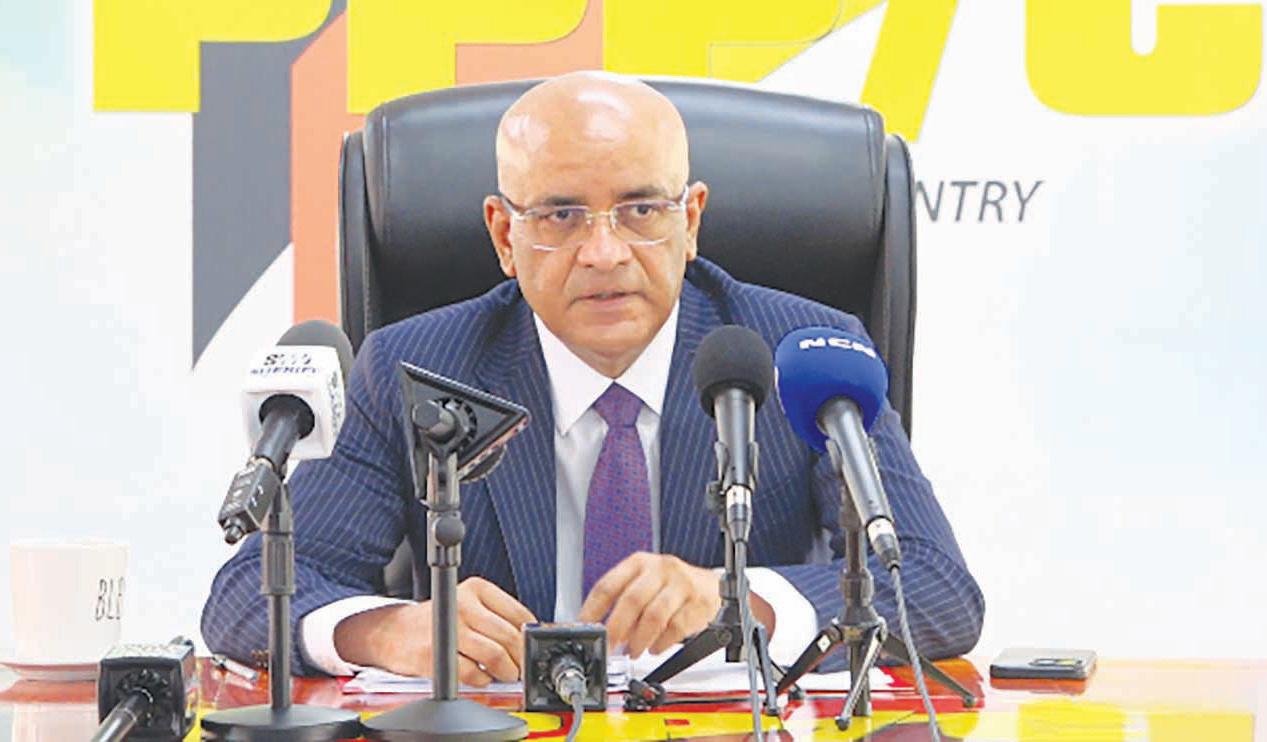
The post-mortem examination (PME), conducted by a team of three internationally recognized pathologists, including Dr. Glenn Rudner, Dr. Gary Collins, and Dr. Shubhakar Karra Paul, concluded that her cause of death was consistent with drowning. The autopsy cited classic signs such as fluid in the lungs which is consistent with drowning. It was also revealed that there was no physical trauma or violence to her body.






Students across Guyana proudly wave the Golden Arrowhead during Flag Day activities in celebration of the nation’s 59th Indepen alive with colour and patriotic spirit, reflecting a nationwide call for citizens to display the national flag as a symbol of unity,
Independence anniversary. From the coast to the hinterland, schools came ity, cultural pride, and commitment to safeguarding Guyana’s sovereignty




Housing and Water Minister, Collin
Croal has clarified that the design of houses built for beneficiaries in hinterland regions differs from
those on the coast for several important reasons. His comments came in response to

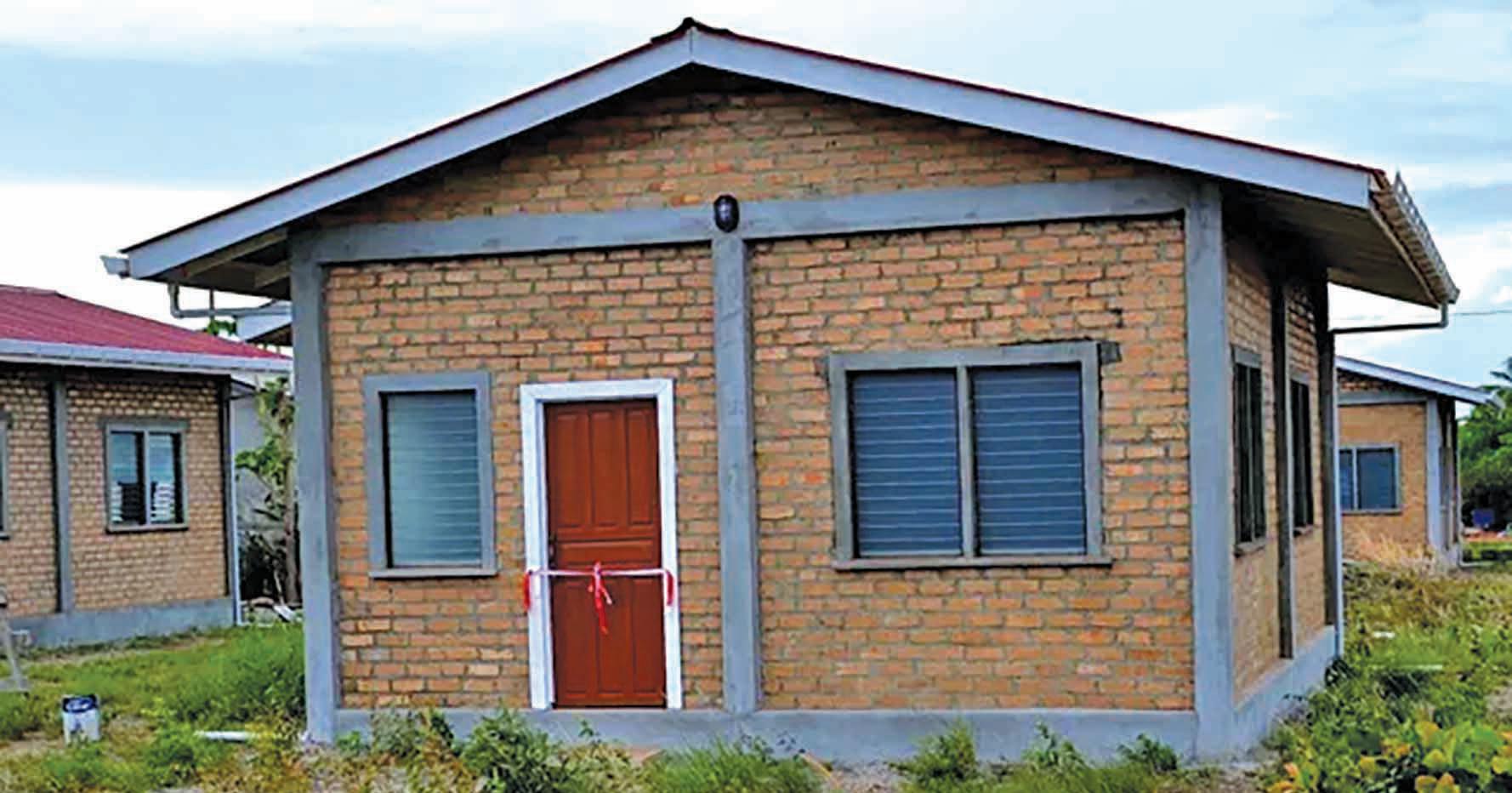
questions that were raised at the National Toshaos Council (NTC) Conference by community leaders, who asked about the houses being built by the Government in the hinterland not designed in the same manner as those coastal areas.
“The hinterland housing program, you will recognize—and many of you have been asking—for similar types of houses that you see on the coastline. But you also have to understand that in the coastal housing program, beneficiaries pay for their houses. In contrast, your land is what is called communal land.”
He further explained that individual ownership is a key difference. Unlike coastal residents who can use their land titles as collateral at financial institutions, hinterland residents cannot do so with communal land.
Croal emphasised that the hinterland housing initiative is a direct investment by the PPP/C Government into hinterland communities.
He stressed that the housing program is designed to reflect and support the local context of each village.
“The program is tailored to take into consideration the local scenario. For example, in some Region 1 areas where there is easier access to wood and lumber, wooden houses are constructed. In Region 9, the goal is to encourage village economies.”
He noted that this approach creates economic spin-offs, as the ministry does not aim to "just build houses for the sake of building," but also to support local economies.
“In supporting the vil-
lage economy—for those that have been making clay blocks for years—we’ve worked with many of your villages to supply those blocks. Similarly, for the wood needed for building, your contribution includes providing two skilled persons to assist in construction. That is part of your ownership.”
Croal also clarified that the ministry does not determine who the beneficiaries are:
“We give the number of houses to be built, but you determine who the beneficiaries are. This is part of ensuring fairness and your involvement in the process.”
He gave assurances that all 29 listed villages where the housing program has not yet been completed will receive their houses:
“To those areas still awaiting completion of housing projects, rest assured— they will be done. You will not be affected.”
However, the minister also addressed a challenge encountered in Region Nine, where some providers of clay blocks have not met expectations:
“In Region 9, we’ve had some difficulties. In some communities, the traditional suppliers of clay blocks have been delinquent, even during the dry season when production is possible. And while some suggest we source blocks from Bonfim or Boa Vista, we’ve said no. This is a Government of Guyana program, and we want to ensure that the economic benefits stay within your communities.”
Another issue raised was the transportation of key materials for building houses in far-flung hinterland areas.
“For example, I have a memo on my desk for the Region 8 communities and Region 7 support, to be able to transport materials—like zinc sheets—which are required to be purchased in Georgetown. The transport mechanism has been a challenge for some villages, and it will also become a challenge when we implement the $3 million program for every community.”
He added “The airline costs to freight some of the materials in are significant. Most times, we have to wait for the Army’s Skyvan, which is the only plane capable of carrying the volume and weight of materials required.”
Croal encouraged continued partnership and responsibility among village leaders and beneficiaries, reinforcing the government's commitment to equitable development across all regions.
As part of the hinterland initiative, the government has committed to building 400 houses in Regions One, Seven, Eight, and Nine to provide sustainable housing to vulnerable families.
The 20 by 25 feet houses cost approximately $3 million each, and were built utilising materials and labour sourced from the area.
A total of 163 houses have already been completed at Kokerite, Warapoka, Haimaruni, Tiger Pond, Lethem, Yakarinta, Smith Creek, Blackwater Savannah, Nappi, Shiriri, Crashwater, Quatata, Rupunau and Yurong Paru.
The selection of the beneficiaries is conducted transparently at a general meeting, where two-thirds of the majority must agree.


As the Labour Ministry through the Board of Industrial Training (BIT) continues to equip Guyanese with the necessary skills needed to access the country’s diverse job market, these training opportunities are being extended to hinterland communities, where more than 1000 citizens are expected to benefit.
The rollout of training programmes in the Hinterland regions was highlighted by Labour Minister Joseph Hamilton on Thursday during day four of the National Toshaos Council (NTC)Conference, at the Arthur Chung Conference Centre (ACCC).
During his presentation, Minister Hamilton reaffirmed the Government’s commitment towards ensuring that all Guyanese, regardless of geography, have access to the tools of empowerment, specifically through education and skills training.
In this regard, the minister highlighted that more than 50 hinterland communities will benefit from a number of training programmes this year; a direct result of an over $220 million investment from the government.
“In 2025, BIT is projected to roll out 97 training programs across 58 communities, with 28 programs already underway and 59
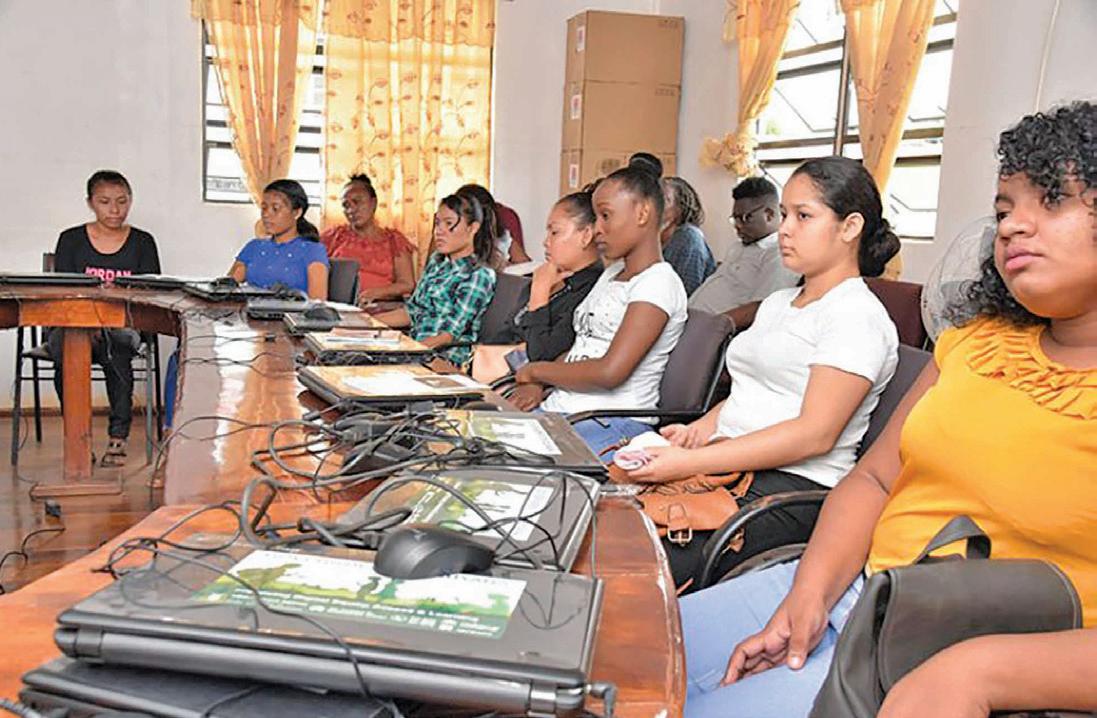
more pending final logistics arrangements. We aim to directly engage 1,300 beneficiaries, including 722 males and 578 females, under a budgeted investment of $221 million in Region 1, 7, 8 and 9, and the riverine communities,” he disclosed.
Moreover, the minister revealed that programmes have not started in several regions due to a lack of skilled personnel. On this point, Minister Hamilton highlighted the importance of a selected trainer being a person who lives within these communities.
“Because for us, our first stop when we're looking for a trainer is to ensure that someone from the village is the trainer. We don't want to import trainers into your village. Importantly, because the monies that will be paid to the trainer, we want [him/her] to be residing in the village and not bring-
ing people into the village who, when we give them the cheque, they will change it in Georgetown and you will not have access to that.”
Additionally, Minister Hamilton also highlighted the significant progress that BIT has made over the years in training hinterland residents.
“From 2020 to 2024, the Board of Industrial Training – we were able to train and certify 2,144 residents from across Region 1, 2, 3, 5, 6, 7, 8, 9 and 10 in key occupational areas. Just to name a few: electrical installation, heavy-duty equipment operation, welding and fabrication, agro-processing, photovoltaic maintenance and repairs, small engine repairs and ICT.”
BIT in Guyana aims to develop a skilled and competent workforce to meet the needs of the industrial sector and economy.

Guyana’s thriving agriculture sector has recently gained global attention following a research study which placed Guyana at the top of the global leader board, listing the country as the only one in the world that can self-sufficiently feed all its citizens.
The study, published in Nature Food, investigated how well each country could feed their populations in seven food groups: fruits, vegetables, dairy, fish, meat, plant-based protein and starchy staples.
According to the study, out of 186 countries, only Guyana produces enough food to self-sufficiently feed all its citizens without foreign imports. Worldwide, the study found that 65 percent of countries were overproducing meat and dairy, compared to their own population’s dietary needs.
According to new research, Guyana was the only country that could boast total self-sufficiency, while China and Vietnam were close behind, being able to produced enough food in six out of the seven food groups.
Just one in seven of the tested countries were judged self-sufficient in five or more categories. At the same time, there was a global shortfall in nutrient-dense plants, with less than half of countries involved in the study producing enough plantbased protein – such as beans, chickpeas, lentils, nuts and seeds, or starchy carbs, and only 24 percent growing enough vegetables.
Over the last few years, Guyana has been working to transform its food security efforts, while increasing interventions to provide farmers with more access to local and regional markets for their agricultural produce.
Last September, Guyana had reached a major milestone in the fight against hunger, with undernourishment levels falling below 2.5 percent.
Statistics also show that this figure was significantly lower than the regional average of 6.6 percent and the global average of 9.1 percent, which ultimately positions Guyana as a leader in food security across the Caribbean and Latin America.
During a high-level dialogue: Reflections on the fight against hunger in Latin America and the Caribbean, Agriculture Minister Zulfikar Mustapha highlighted the country’s success in reducing hunger, attributing it to deliberate interventions.
In addition to reducing undernourishment, Mustapha highlighted that Guyana has made substantial progress in addressing food insecurity. While the new figure is an improvement in comparison to previous times, Mustapha acknowledged that it still means that many Guyanese are affected by food insecurity. He also emphasised that Guyana’s strategy is built around two main goals: expanding the agricultural sector, and becoming a lead-
ing exporter of agricultural products within the Region. These initiatives fall under the Vision 25 by 2025 plan, which aims to reduce Caricom’s food import bill by 25 percent by the year 2025. Moreover, this year Guyana’s agriculture was significantly boosted with $104.6 billion allocated in the 2025 National Budget for the industry. An allocation of $430.9 million has been set aside for rice in 2025. This investment will see a number of new initiatives being developed to further increase the country’s production.
To support the cultivation of other crops, $2.9 billion has been budgeted by the government. These crops include corn and soya, spices, citrus and other high-value crops such as broccoli and cauliflower.
In addition, the coconut industry has been a bolstering force to the agriculture sector, and as such, $116 million has been put aside for this initiative. Moreover, to ensure the easy manufacturing of agricultural products, a sum of $800 million was allocated for the agro-processing industry.
In terms of livestock, the government has budgeted $1.7 billion to boost the business. Meanwhile, a staggering $1.3 billion will go towards the development of the fisheries and aquaculture sector. This will see 80 additional brackish water shrimp ponds being constructed in Region Six and 50 more fishing cages installed.
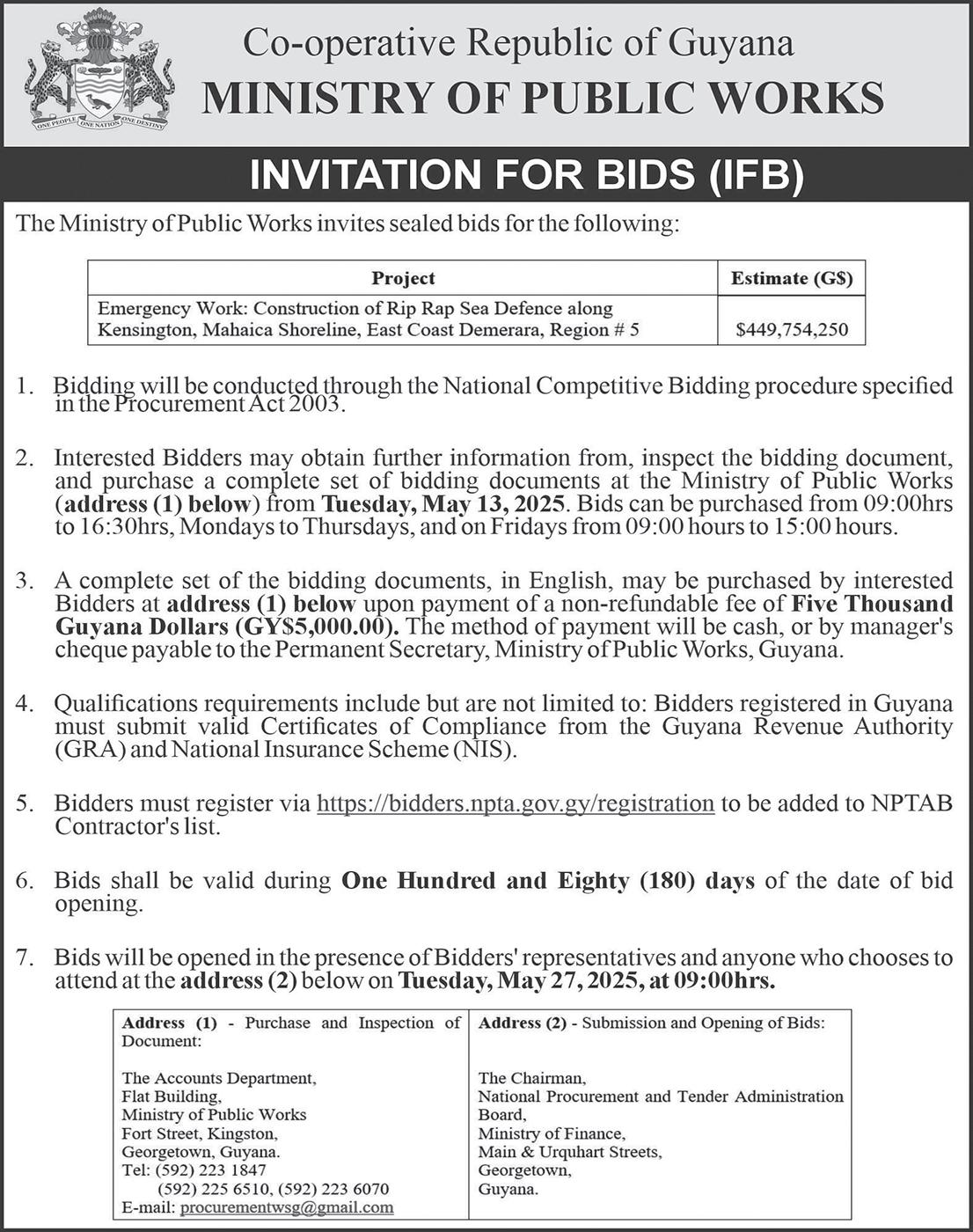

Top U.S. oil producer Exxon Mobil and Hess will meet faceto-face on Monday in a court hearing to determine the fate of Chevron’s $53 billion deal to buy Hess and with it a prized stake in Guyana’s prolific oilfields.
The planned acquisition, announced in October 2023, is one of the oil industry’s biggest deals in years. It is key to Chevron CEO Mike Wirth’s strategy of improving the oil company’s performance. Exxon and China’s CNOOC, Hess’ partners in Guyana, filed arbitration disputes early last year, which have delayed the deal’s closing and caused Chevron to miss out on increased output and revenue.
Hess’ most attractive asset is its 30% stake in the Stabroek Block off the coast of Guyana, operated by Exxon. Guyana is one of the world’s fastest-growing oil producers and the Stabroek Block is estimated to hold more than 11 billion barrels of oil equivalent.
Exxon and CNOOC claim that they have a contractual right of first refusal to purchase Hess’ stake in the Guyana field.
Chevron and Hess argue the clause does not apply to

the sale of the whole company. If they lose the arbitration and are unable to agree on an acceptable resolution with Exxon and CNOOC, the acquisition would fail, according to the terms of the deal.
A three-member arbitration tribunal under the International Chamber of Commerce will analyze the dispute in a confidential hearing that starts on Monday in London.
The joint operating agreement in the Stabroek Block between Hess, Exxon and CNOOC is governed by UK law, according to a source familiar with the terms. By the time the hearing kicks off, Hess, Exxon and CNOOC should have already submitted in writing the majority of the testimony that will be con-
sidered by the tribunal, according to four international arbitration attorneys who are familiar with the ICC’s procedures. A spokesperson for Hess pointed to a previous filing that said the company expects a decision after the hearing in the third quarter, while an Exxon spokesperson referred back to previous public comments about the case. Chevron and CNOOC did not respond to requests for comment.
Prior to the hearing, the companies may submit documents and written statements from witnesses or experts they have called on to support their claims in the dispute.
This phase is typically the longest portion of arbitration proceedings, often taking a year, said William

Kirtley, managing partner at Aceris Law, a boutique international arbitration law firm.
The average ICC arbitration case takes over two years to reach a resolution from the time proceedings are initiated, according to the court’s annual report.
Hess, Chevron and Exxon have said they expect a resolution in their dispute by the third quarter of this year, which would be about 18 months after Exxon and CNOOC initiated arbitration proceedings.
“This is relatively fast for an ICC arbitration, especially when considering the size of the dispute,” Kirtley said.
“It suggests that neither party is engaging in delaying tactics to increase the duration of the case.”
What to expect during the hearing
On Monday, each party will begin with opening statements before the arbitration tribunal. Witnesses or experts will be cross-examined, having already submitted direct testimony to the tribunal prior to the hearing.
The arbitrators will interrogate the claims of each side of the dispute and may also ask questions of the witnesses and experts.
Hearings involving large companies or disputes are typically scheduled over the course of five days, three of the attorneys said.
Hess, Exxon and CNOOC may elect to give oral closing statements at the end of the hearing, submit a written closing statement, or both.
The arbitrators may pro-
vide a list of key points or remaining questions for the parties to address in their closing statements, two of the attorneys said.
The tribunal will formally close the hearing, after which Hess, Exxon and CNOOC will not be allowed to submit further arguments unless authorized by the arbitrators.
Two of the three arbitrators must agree on the final decision, one of the lawyers said.
While the ICC’s rules of arbitration state that the tribunal must render a decision within six months, the four attorneys said the waiting game can vary greatly and the timeline may be extended in some cases.
The tribunal will send its draft decision to the ICC, which will review and approve the award before it is delivered to the parties.
Under the English Arbitration Act of 1996, parties may challenge an arbitral decision on limited grounds, such as serious irregularities, including violations of due process. While parties frequently attempt to set aside awards, such challenges are rarely successful, Kirtley said. (Reuters)
ABrazilian businessman was granted $75,000 bail when he was brought before the courts on Friday, following a major operation by the Special Organised Crime Unit (SOCU) in Mahdia on Wednesday, which resulted in the seizure of raw gold and more than $17 million in cash, along with various documents and equipment.
Osmil Da Silva, 36, who operates a shop in Mahdia, was formally charged at the Georgetown Magistrates’ Courts. He appeared before Acting Chief Magistrate Faith McGusty to answer to a charge of unlawful possession of 43.8655 ounces of gold. The alleged incident occurred on Wednesday at Lot 111 Mile, Mahdia, located in the Potaro-Siparuni Region (Region Eight).
The prosecution stated that at the time of the alleged offence, Da Silva was not recognised as a gold producer under the Guyana Gold Board Act, Chapter 66:01, Section 2.
Speaking through an in-

terpreter, Da Silva, who only speaks Portuguese, entered a not guilty plea.
Defence Attorney Latchmie Rahamat described the charge as unexpected, pointing out that her client is a licensed operator under the Guyana Geology and Mines Commission (GGMC). She further indicated that Da Silva runs a legitimate establishment known as Filhao Shop. Rahamat highlighted that her client is a father of two,
has no prior convictions or pending legal matters, and maintains solid ties within the Mahdia community.
“He is determined to defend his reputation,” she added.
SOCU Prosecutor Neville Jeffers did not oppose bail, but recommended that it be subject to certain conditions. He informed the court that the offence carries a fine of $75,000.
Magistrate McGusty subsequently granted bail in the sum of $75,000, noting that bail must not exceed the maximum penalty provided for under the law.
The case has been transferred to the Mahdia Magistrate’s Court and is scheduled for report and disclosure of statements on June 25, 2025.
Da Silva is also being represented by Attorney-atLaw Aquella Best.
The charge originates from an intelligence-driven operation executed by SOCU in Mahdia earlier in the week. Deputy Commissioner of Police

and SOCU Head Fazil Karimbaksh confirmed that officers conducted a raid at Filhao Shop, where they disrupted what is believed to be an illegal gold smuggling operation.
During the operation, SOCU agents recovered the gold, large sums of local currency, equipment, and documentation linked to the alleged activities.
The Unit noted that such incidents are becoming increasingly common, raising
alarms about the extent of transnational gold smuggling operations taking root within Guyana.
“This operation forms part of our ongoing strategy to dismantle illicit networks and safeguard the country’s valuable mineral assets,” SOCU said in a statement issued Thursday. The agency underscored that Wednesday’s raid is a clear signal of law enforcement’s heightened efforts to curb illegal mining and smuggling.
The statement also highlighted that Da Silva’s case adds to a rising number of incidents involving Brazilian nationals allegedly engaged in unauthorised gold trading and extraction in the country’s interior regions.
SOCU stressed that the seizure disrupted a potential cross-border smuggling attempt, further illustrating the persistent threats posed by international smuggling rings.


Superintendent of the Barbados Police Service, Christine Standford, while delivering a message that can be adapted regionally and within Guyana, expressed that improving the public’s trust and perception of the police is necessary if efforts to improve public safety are to be successful.
She emphasized that this can only be achieved if persons within communities feel they are being treated fairly, and provided with good customer service.
She was at the time addressing 16 officers from the Regional Security System (RSS) Member States who had recently completed a two-week Community Policing course, hosted by the RSS Training Institute with support from the 11th
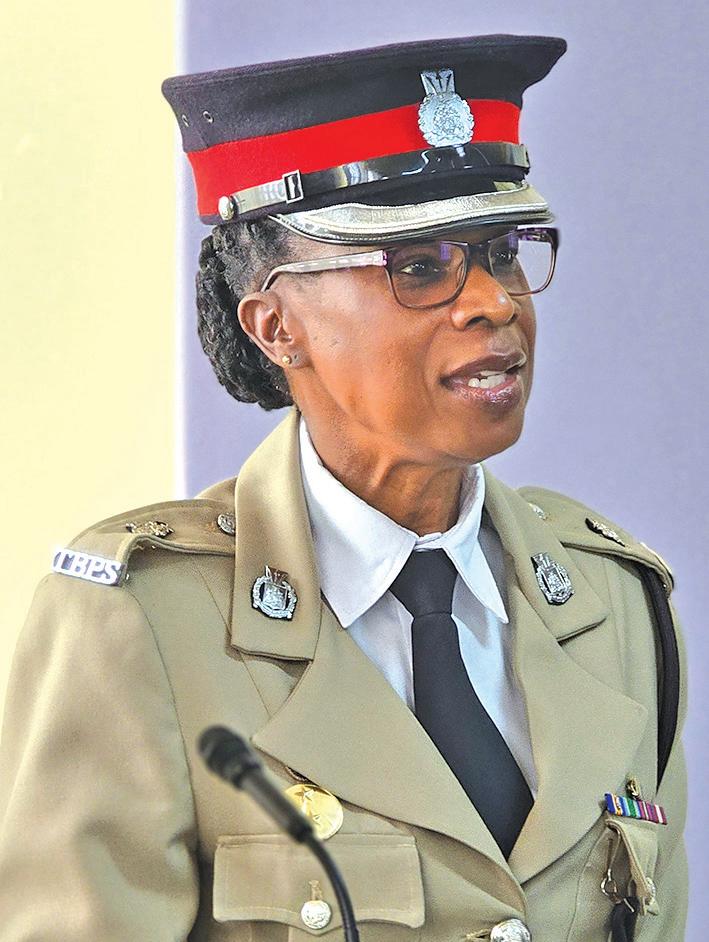
for the police would be at an all-time high when the crime rate is low… but with recorded low crime rates and the best-trained officers we’ve ever had, the public’s perception of the police has not improved. Research
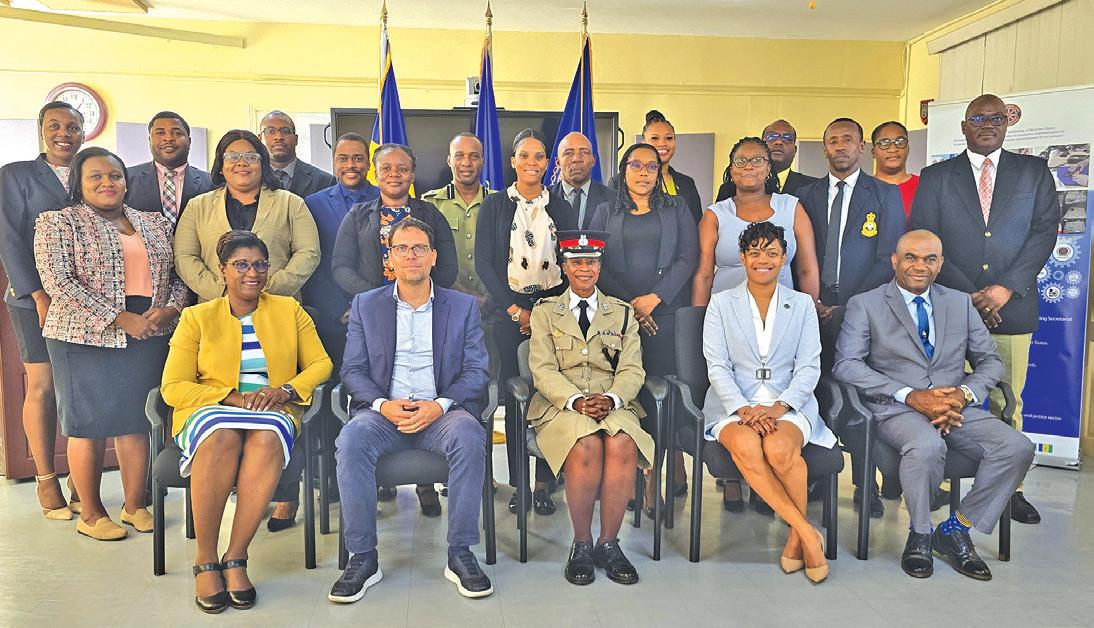
successfully
European Development Fund Project.
Superintendent Standford pointed out that law enforcement officials currently face challenges in building relationships with the public they serve, due to a history of negative interactions with the police or “depressed intergenerational socio-economic circumstances.”
“You would expect that public trust and support
has shown that people do not care as much about the crime rate as they do about how they are treated by the police.
“If they have not personally felt mistreated by the police, they have heard stories from friends who have. Those bad stories stick for a long time. Rebuilding trust in a community where it has been broken or damaged can be done most effectively one interaction at
a time,” she stated.
The police official added that officers should listen to individuals as they tell their side of the story, explain what they are going to do and why, clarify why action is being taken, and allow everyone to maintain their dignity.
“I promise you, if every community officer does these four things in their community relations contacts, it will dramatically improve cooperation in the various communities and the overall level of support for the police,” she maintained, noting that police officers at all levels must see community engagement as a priority in community policing.
She proposed that to effectively engage communities, law enforcement officials must embody inclusion, communication, empowerment, and feedback in their engagement, affirming that “investing time and resources in community engagement will invariably pay dividends in the future.”
Team Leader for Security, Justice and Human Rights at the European Union, Alessandro Tedesco, stated that his organization was proud to have supported such an initiative, and lauded the Community Police Officers for their work in what he described as “a crucial job.”
“There are a number of things you can detect in neighbourhoods that would otherwise go unnoticed— signs on streets, words and lyrics of songs, things to which we may not pay attention—but for a Community Policing Officer, this could be an interesting way of obtaining information on relevant matters,” Tedesco
pointed out.
Meanwhile, Director of Strategic Services and International Affairs, Rhea Reid-Bowen, indicated that the RSS had acknowledged the challenges faced by police as they attempted to implement a more citizen-oriented approach to policing.
The course, therefore, was one of the RSS’ efforts to support the professionalisation of the police forces across its Member States, while embracing a more inclusive and participatory approach to crime solving.
Mrs. Reid-Bowen asserted: “It is this sustained effort towards trust-building with the public that will enable community policing philosophies to thrive. There is a willingness by citizens to cooperate with law enforcement institutions to address the issues of crime, and there exists a yearning for citizen-security-oriented approaches to crime control and security.”
A21-year-old Cuban national was brutally killed and her mother seriously injured in what police are treating as a domestic homicide at Pike Street, Kitty, Georgetown early Friday morning.
The deceased, Davely Morales, was a sales representative residing at Lot 56 Pike Street, Georgetown, along with her mother, nineyear-old sister, and stepfather, 40-year-old Wispriey Alfonso, who is now in police custody.
According to police, the incident unfolded around 7:00h on Friday, when screams were heard coming from Apartment #1 of the building.
A tenant told investigators he rushed out to find the apartment door open and witnessed Alfonso allegedly assaulting Morales’ mother, Milaysi Rodrigues, with a chopper. Morales was seen lying beside her mother in a pool of blood, bearing multiple chop wounds.
Despite her severe injuries, Morales managed to get up and run from the apartment, but collapsed in the walkway. The suspect
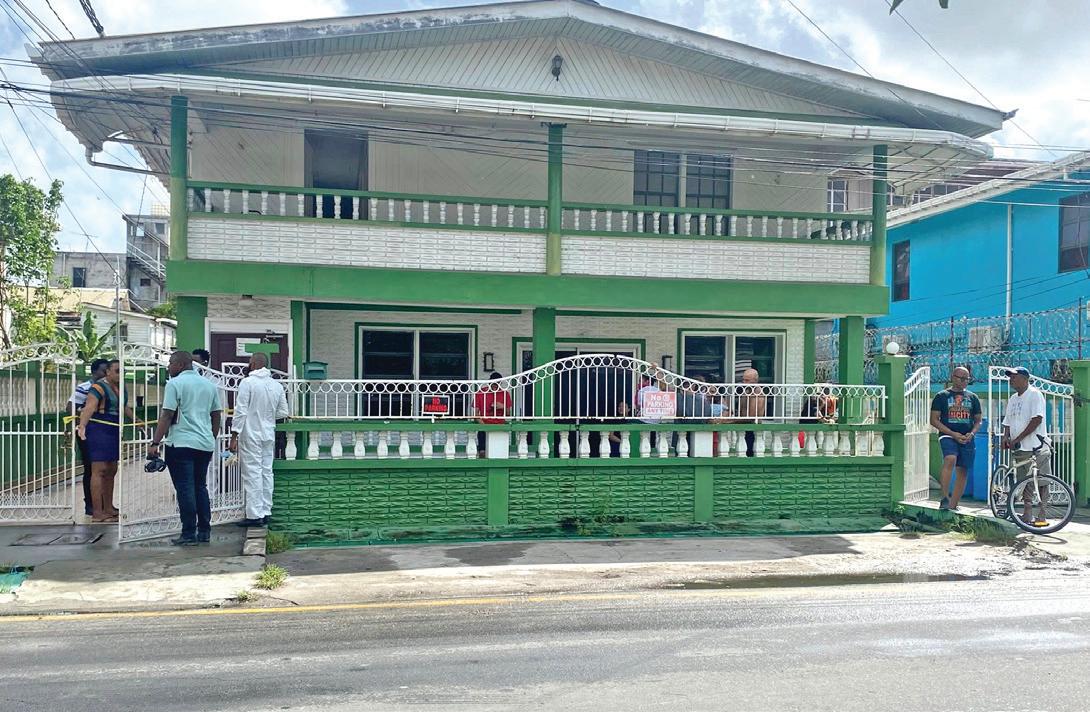
reportedly fled the scene shortly afterward. Emergency Medical Technicians from the Central Fire Station responded, and Morales was pronounced dead at the scene by a doctor from the Georgetown Public Hospital. Rodrigues was rushed to the hospital with multiple wounds and remains in serious condition.
Police said Morales sustained chop wounds to her hands, the back of her head, and her jaw. Her body was later transported to Memorial Gardens Funeral Home, where a post-mortem
examination is expected to be conducted. Meanwhile, Alfonso walked into the Kitty Police Station shortly after the incident, allegedly carrying the blood-stained chopper used in the attack. He was arrested and remains in custody as investigations continue.
According to police, the Cuban family had only recently arrived in Guyana, about a month ago, and had been renting the apartment where the tragic incident occurred. Investigations are ongoing.
Recognizing that many hinterland workers often fall prey to big companies who exploit and take advantage of their lack of knowledge about workers’ rights, the Ministry of Labour has revealed plans to send trainers into various Indigenous communities, to educate workers about contractual obligations.
The initiative, which will see hinterland residents being more aware of their rights as workers, and of contractual obligations, was announced by Labour Minister Joseph Hamilton on Thursday, during day four of the National Toshaos Council (NTC) Conference, at the Arthur Chung Conference Centre (ACCC) in Georgetown.
According to Minister Hamilton, hinterland residents have been constantly exploited by contractors, particularly those in the gold mining and logging industry over the years.
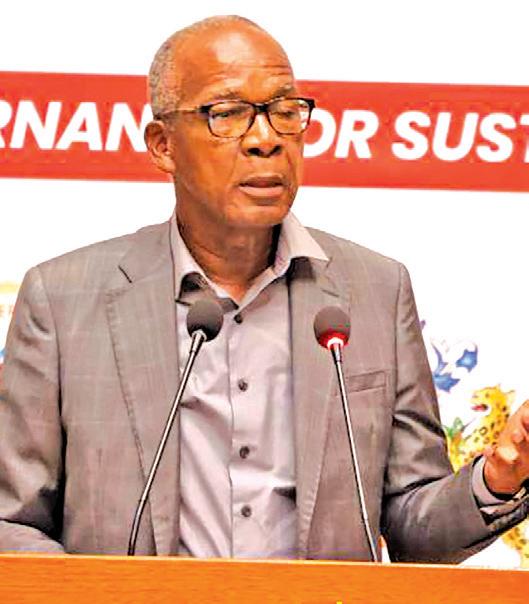
“This [is an] important issue, because – many Toshaos would know... – you have regular labour relations issue in your community, where people go out and work for contractors, or they go out and work for miners or loggers, and in a lot of instances they are not paid. … I have had engagement with persons from many villages ... and I would ask this simple question. ‘Do you know the name of the person you are working with [for]
the last six months?’ And I tell you, in one instance, the seven gentlemen told me the man that is called Mango.”
The minister added, “So they weren’t aware of the name of the person who they’re working with. They weren’t aware where the business place is located, and they weren’t aware of the person at all. So at the level of the Ministry of Labour, we are incapable of ensuring we go behind that person to ensure that you’re paid or your villagers are paid.”
In this regard, Minister Hamilton reaffirmed the ministry’s commitment towards ensuring hinterland workers are protected from these predators. In fact, the labour minister highlighted that there are readily available personnel who can deliver vital educational courses in hinterland communities.
“We have, and we can put at your disposal, our lawyers and the chief labour officer,
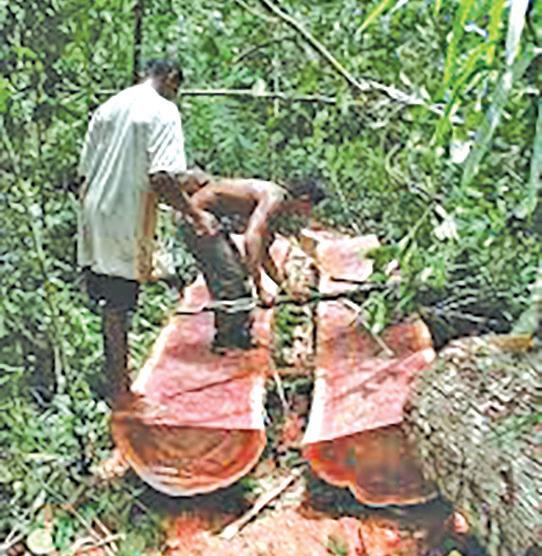
who also is a lawyer, that they can have crash courses with counsellors and with Toshaos just to train you to do simple contracts, not to be a lawyer. Because the problem I have,
and we have, is the employee says the man promised me
$7,500 a day and the employer says no, I promised him
$5,000 per day. If we have to take that employer to court,
we can’t take ‘he say and she says’ to the magistrate. We have to take evidence.”
“So I’m urging again, Toshaos, to help us so that we can help your community, that we ensure that when people are leaving your village to go work with somebody, they have contractual obligations –the contractor, the gold miner; and we can help you via the legal team at the Ministry of Labour, to ensure that you’re trained in this regard.”
The labour ministry plays a vital role in protecting Indigenous peoples’ workers rights. They ensure Indigenous workers enjoy the same labour rights as other workers, including fair hiring, equal opportunities, and protection from discrimination.
The ministry also works to eliminate child labour and promote safe working conditions, collaborating with Indigenous leaders and relevant agencies.

Well-known Venezuela opposition politician
Juan Pablo Guanipa, a close ally of opposition leader Maria Corina Machado, is under arrest for allegedly leading a terrorist plot, Interior Minister Diosdado Cabello said on Friday.
Officials regularly accuse the opposition of conspiring with countries such as the United States to commit terrorism, overthrow President Nicolas Maduro and attack Venezuela's power grid. The opposition and Washington have always denied the accusations.
Guanipa's arrest comes just days ahead of Venezuela's parliamentary elections.
Seventy people, including foreigners, have been detained in the alleged plot to carry out attacks during Sunday's regional and legislative elections, Cabello said, adding that Guanipa also faces charges of money laundering and inciting hatred.
Guanipa, a 60-year-old lawyer and long-time politician, had been in hiding since a presidential election last year. Machado, who was barred from running for president but re-
mains popular among many Venezuelans, is also in hiding.
Guanipa said his arrest was motivated by the government's fear of the Venezuelan people and their votes last year.
"Brothers, if you are reading this it is because I have been kidnapped by the forces of the regime of Nicolas Maduro," he said in a statement posted to his X account. "I don't know what will happen to me in the coming hours, days and weeks. But I am sure that we will win this long fight against the dictatorship." (Excerpt from Reuters)
Banana producer Chiquita has announced mass layoffs in Panama amid an ongoing strike.
The United Statesowned banana giant said on Friday it was letting “all” daily labourers go for the “unjustified abandonment of work at our plantations”.
Workers have been on strike for more than a month, as part of nation-wide industrial action protesting new social security laws lowering pensions.
The government has branded the strikes “illegal” and said the sackings are the result of workers’ “intransigence”.
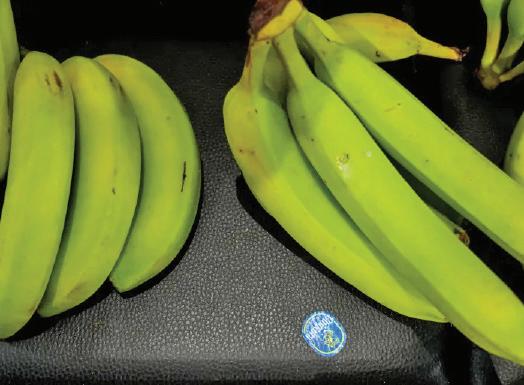
Chiquita Panama has reportedly sacked close to 5,000 workers out of a total of 6,500, over strike action prompted by government changes to social security
The company did not elaborate on the number of people affected by the decision. However, the Reuters news agency reported that
about 5,000 workers out of 6,500 have lost their jobs, referring to an unnamed source. (Excerpt from Al Jazeera)
T&T PM threatens to take back disputed campus building from UWI
Trinidad & Tobago
PM, Kamla PersadBissessar, warned University of the West Indies (UWI) officials not to “test her” on the future of the Debe Campus of UWI, which was built by the current UNC govt in their 2010-2015 term at reported costs of $500 million-plus.
“Do not test me! If I have to do it and if we have to do it, I’ll take that campus back and put it under Government control to make sure we complete it!” Persad-Bissessar said at Thursday’s post-Cabinet media conference at the Cabildo Building, Port-ofSpain.
The developing face-off between her Government and UWI management regarding the Debe campus followed a recent tour of the facility by Energy Minister Dr Roodal Moonilal, who described its state as “hor-
rific”, after 10 years of neglect.
While intended as the new Faculty of Law in 2017, Faculty staff and students protested the move to Debe, and UWI administration subsequently decided not to relocate the faculty there. It was used by the last Government as a step-down medical facility during the COVID pandemic.
In 2021, the University Council, the highest governing body of UWI’s regional system, approved a decision to use the facility for the new Global School of Medicine (GSM).
UWI said despite very tight financial resources, it had prioritised and proceeded with critical repair work and security enhancements to prepare the campus in anticipation of phased reopening, beginning in August.
Donald Trump has threatened to impose a 25% tariff on iPhones if they are not made in the United States, as he stepped up the pressure on Apple to build its signature product in the country.
The president wiped approximately $70bn (£52bn) off the company’s shares with a post on the Truth Social platform that said iPhones sold inside the US must be made within the country’s borders.
Trump said in the post: “I have long ago informed Tim Cook of Apple that I expect their iPhones that will be sold in the United States of America will be manufactured and built in the United States, not India, or anyplace else. If that is not the case, a Tariff of at least 25% must be paid by Apple to the US.”
Apple shares fell 2.6% on Trump’s comments,
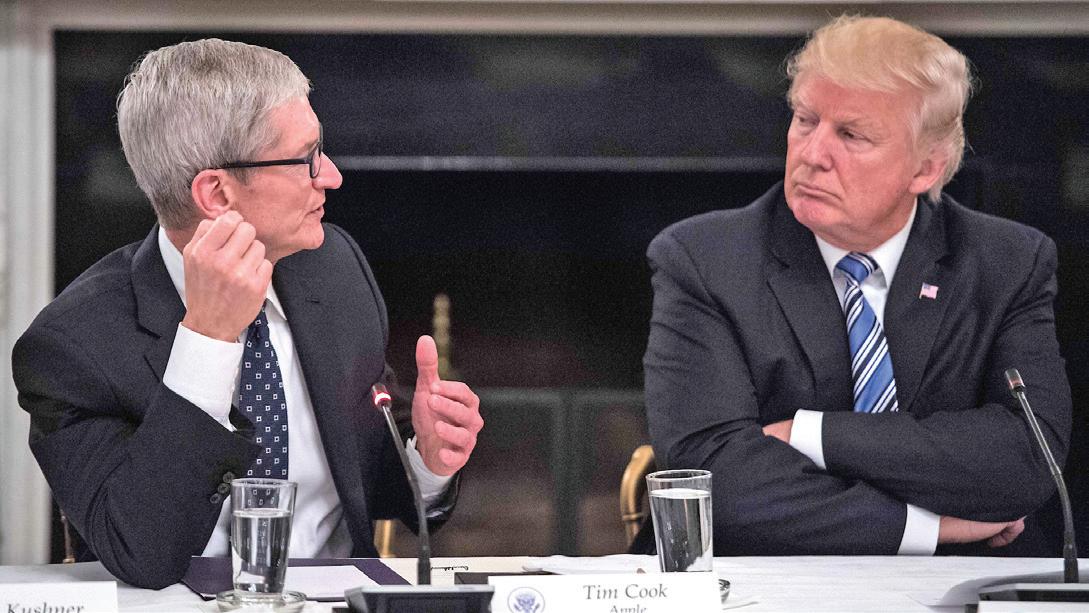
pushing the company’s valuation just below $3tn.
Apple won’t be alone. In remarks to reporters at the White House on Friday afternoon, Trump said that he would also impose a 25% tariff on Samsung and any other phone manufacturer that makes phones outside of the US, or, he said, “it would not be fair.”
“When they build their plant here, there’s no tariffs. So they’re going to be building plants here,” Trump said.
The US is Apple’s biggest iPhone market, where
it sells more than 60m of the handsets annually.
Analysts have warned that moving US-bound iPhone production to the States would be prohibitively expensive, owing to the lack of facilities and flexible workforce that Apple has access to in China.
Wedbush Securities, a financial services firm, said last month that an iPhone made in the US would be three times more expensive than now at US$3,500. (Excerpt from The Guardian)
Three cops charged in the fatal beating of 31-year-old construction worker Mario Deane while in police custody in 2014, were on Thursday found guilty in the Westmoreland Circuit Court, Jamaica.
The three accused: Corporal Elaine Stewart and District Constables Marlon Grant and Juliana Clevon, were all charged with manslaughter and misconduct in a public office.
The seven-member jury returned the six to one ver-
It was noted that the campus was largely underutilised for several years and experienced natural deterioration in certain areas.
UWI said the campus is also intended to support delivery of selected programmes across multiple faculties and despite protests regarding the relocation of the Law Faculty, the administration is open to discussions with Government on its inclusion in planned programmes.
Yesterday, however, Persad-Bissessar warned off UWI’s administration.
“That campus will house what the Government says it will house. The (UWI) administration will have no say in that. They cannot dictate to us what they want to put there …,” she stated. (Source: Trinidad Guardian)
dict on each count after deliberating on the facts presented in the case for a little more than two hours.
Before the case was handed over to the jury, presiding Supreme Court Judge Justice Courtney Daye instructed them to address each count separately for each accused — count three, manslaughter by gross negligence; count two, misconduct in a public office and count one, doing acts intended to pervert the course of justice.
On Thursday, the jury returned guilty for
all three on count three and two. They also found Stewart guilty on count one.
The allegations in the case are that Deane was arrested for possession of a ganja spliff and placed in custody, where he was brutally beaten on August 3, 2014. He sustained severe injuries to his brain, which left him in a coma. He died three days later at Cornwall Regional Hospital in St James. (Source: Jamaica Observer)
Suspect charged with murder of two Israeli embassy workers in Washington DC
The suspect accused of gunning down two Israeli embassy staff members outside a Jewish museum in Washington DC has been charged with first-degree murder, as well as murder of foreign officials and related firearm charges.
Wednesday night's attack is being investigated as a hate crime, and more charges are expected, US Attorney Jeanine Pirro said at a news conference.
"This is a death penalty-eligible case," she said on Thursday, adding that it is too early to say whether prosecutors will decide to seek a death sentence.
Steve Jenson, from the FBI's Washington DC field office, called the killings "an act of terror and di-

rected violence against the Jewish community".
Couple Yaron Lischinsky and Sarah Lynn Milgrim were shot dead outside an event at the Capital Jewish Museum in Washington DC around 21:08 local time on Wednesday, police said.
The suspect opened fire on a group of four exiting the event, killing the two victims, police said.
Police identified the suspect as 30-year-old Elias Rodriguez from Chicago who had bought a ticket to the museum event about three hours before it began. He was arrested at the scene shortly after the shooting. (Excerpt from BBC News)




Oil prices gained on Friday as U.S. buyers covered positions ahead of the three-day Memorial Day weekend amid worries over the latest round of nuclear talks between American and Iranian negotiators.
Brent crude futures settled at $64.78 a barrel, up 34 cents, or 0.54%. U.S. West Texas Intermediate crude futures finished at $61.53, up 33 cents, or 0.54%.
"I think there is some short-covering going into this weekend," said Phil Flynn, senior analyst with Price Futures Group.
U.S. and Iranian negotiators met in Rome on Friday in another round of talks aimed at curtailing the Islamic Republic's nuclear program. Traders are afraid crude supplies could be interrupted if talks fail to reach a deal, Flynn said.
"The oil market has been under pressure from two things," said Andrew Lipow, president of Lipow Oil Associates. "We await the impact of tariffs on oil demand and OPEC+ is expected to increase supply again this summer."
OPEC+, comprising the Organization of the Petroleum Exporting Countries and allies led by Russia is holding meetings next week expected to yield another output increase of 411,000 barrels per day (bpd) for July. (Excerpt from Reuters)
European and North American cybercrime investigators say they have dismantled the heart of a malware operation directed by Russian criminals, after a global operation involving British, Canadian, Danish, Dutch, French, German and US police.
International arrest warrants have been issued for 20 suspects, most of them living in Russia, by European investigators while indictments were unsealed in the US against 16 individuals.
Those charged include the alleged leaders of the Qakbot and Danabot malware operations, including Rustam Rafailevich Gallyamov, 48, who lives in Moscow and Aleksandr Stepanov, 39, AKA JimmBee and Artem Aleksandrovich Kalinkin, 34, AKA Onix, both of Novosibirsk, Russia, the US Department of Justice said.
The Europeans led by the German crime agency, Bundeskriminalamt (BKA) released public appeals in its attempts to track down 18 suspects believed to be involved in the Qakbot malware family along with a third malware known as Trickbot.
BKA and its international counterparts said the majority of the suspects were Russian citizens. The
AUnited States judge has issued a temporary restraining order against an effort to prevent Harvard University from enrolling foreign students.
Friday’s ruling comes in response to an emergency petition filed earlier in the day in the federal district court of Boston, Massachusetts.
In that petition, Harvard sought immediate relief after the administration of President Donald Trump barred it from using a federal government system, the Student and Exchange Visitor Program, that is required for the enrolment of international students.
US District Judge Allison Burroughs agreed with Harvard that the school and its students may suffer harm if the Trump administration’s decision is allowed to take effect. Her injunction is set to last for approximately two weeks, and she set hearing dates on May 27 and 29.
Friday’s lawsuit against
the Trump administration is Harvard’s second in less than two months.
The latest is a response to a decision on Thursday announced by Homeland Security Secretary Kristi Noem. Her department oversees the Student and Exchange Visitor Program, and she said she is revoking Harvard’s privilege to use the system based on its failure to address Trump administration concerns.
The move represents a major escalation in Trump’s pressure campaign against Harvard and other top US universities. He has accused schools of allowing anti-Semitism to fester, promoting “discriminatory” diversity programmes, and pushing ideological slants.
But in Friday’s lawsuit, Harvard called the Trump administration’s actions a “blatant violation” of the US Constitution and other federal laws.
Barring the prestigious Ivy League school from en-

rolling its international students would have an “immediate and devastating effect” on the university and the more than 7,000 visa holders in its student body, it argued.
“With the stroke of a pen, the government has sought to erase a quarter of Harvard’s student body, international students who contribute significantly to the University and its mission,” the complaint said.
“Without its international students, Harvard is not Harvard.”
While there have been instances of harassment from participants on both sides of the issue, protest organisers have rejected claims of widespread anti-Jewish sentiment. Some campus protests have even been spearheaded by Jewish students and organisations, including Jewish Voice for Peace.
Earlier this year, task forces at Harvard itself issued two reports, warning about instances of anti-Arab and anti-Muslim bias, as well as anti-Semitism. (Excerpt from Al Jazeera)
TRussian national Vitalii Nikolayevich Kovalev, 36, already wanted in the US, is one of BKA’s most wanted.
He is allegedly behind Conti, considered to be the most professional and best-organised ransomware blackmail group in the world with Kovalev described as one of the “most successful blackmailers in the history of cybercrime” by German investigators.
Using the pseudonyms Stern and Ben, BKA allege he is claimed to have attacked hundreds of companies worldwide and extracted large ransom payments from them.
Between 2010 and 2022 the Conti group focused specifically on US hospitals, increasing its attacks during the Covid pandemic. US authorities had offered a $10m reward to anyone who would lead them to its figureheads.
Operation Endgame was instigated by the German authorities in 2022. The BKA president, Holger Münch, said Germany was a particular focus of cybercriminals.
Most suspects are operating in Russia, some also in Dubai. Their extradition to Europe or the US was unlikely, Münch said, but their identification was significant and damaging to them. (Excerpt from The Guardian)
he body of a man was found in a car trapped in floodwaters in Australia's southeast on Friday, raising the death toll to four, after three days of incessant rain cut off entire towns, swept away livestock and destroyed homes.
Police said the man was found near Coffs Harbour, around 550 km (342 miles) north of Sydney. The search continued for a person missing since the deluge began early this week.
Around 50,000 people are still isolated, emergency services personnel said, while residents returning to their flooded homes were warned to watch out for dangers.
Television videos showed submerged intersections and street signs, cars up to their windshields in water, after fast-rising
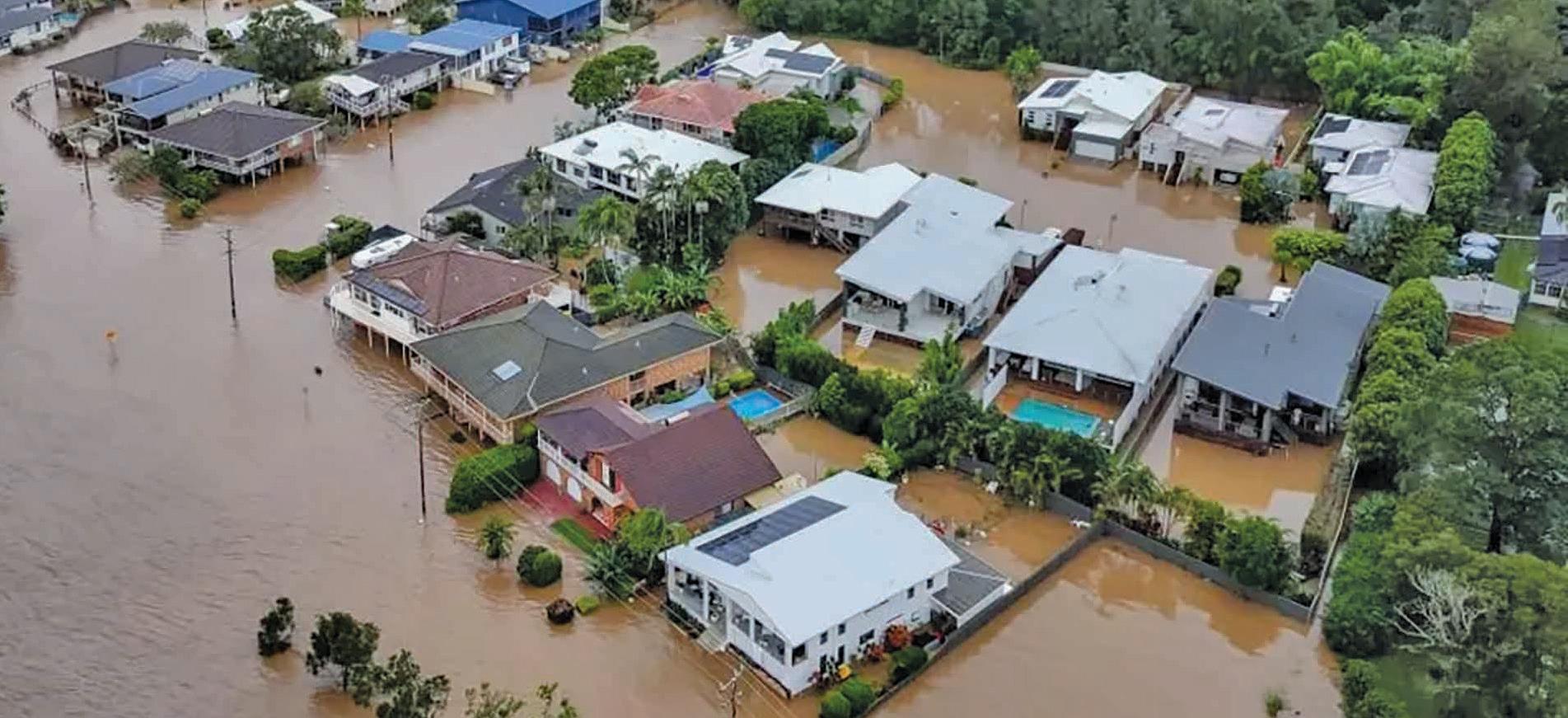
waters burst river banks in the Hunter and Mid North Coast regions of New South Wales, Australia's most populous state.
Debris from the floods, and dead and lost livestock, have washed up on the coast.
A wild weather system that dumped around four months of rain over three
days shifted south towards Sydney on Thursday bringing heavy rain overnight, though the weather bureau, in its latest update, said it is expected to ease by Friday evening.
Water on rail tracks impacted some suburban train lines in Sydney, including its airport line services, while Sydney Airport was
to
of its three runways for one hour on Friday morning due to strong winds, delaying flights.
Warragamba Dam, which supplies 80% of Sydney's water supply and is currently at around 96% of capacity, could spill over, officials said. (Excerpt from Reuters)
US President Donald Trump reignited trade tensions on Friday, threatening a 50% tariff on all goods sent to the United States from the European Union.
The warning against the EU came just hours before the two sides were set to have trade talks. Trump last month announced a 20% tariff on most EU goods, but had halved it to 10% until 8 July to allow time for talks.
"Our discussions with them are going nowhere!"
Trump wrote in a post on
social media on Friday. He said he was recommending that new tariffs kick in on 1 June.
In remarks to reporters at the White House later, Trump said his plan was set.
"I'm not looking for a deal – we've set the deal," he said, before immediately adding that a big investment in the US by a European company might make him open to a delay.
The EU did not immediately respond to the threat. Politicians from members of
the bloc greeted it with dismay but said they did not expect to shift strategy.
"We are maintaining the same line: de-escalation, but we are ready to respond," French Foreign Minister Laurent SaintMartin wrote on social media on Friday morning, adding that the latest threats were "not helping" the negotiations.
Shares in the US and EU fell on Friday after the latest threats, with the S&P 500 down about 1% and Germany's Dax and
France's Cac 40 ending the day down more than 1.5%.
Speaking to Fox News on Friday, US Treasury Secretary Scott Bessent said the US wanted to see more concessions from Europe.
"I believe the president believes that the EU proposals have not been of the same quality that we've seen from our other important trading partners," he said.
"I would hope this would light a fire under the EU," he added. (Excerpt from BBC News)


























TODAY’S WORD -- GREMLINS
(GREMLINS: GREM-lins: Small mischievous gnomes.)
Average mark 39 words Time limit 60 minutes
Can you find 56 or more words in GREMLINS? The list will be published tomorrow.
YESTERDAY’S WORD -- LINGUIST ling lint list listing lung lust lusting insult gilt gist glint glut guilt gust unit unlit until using sign silt sing siting sling slit slug slung snit snug sting stun stung suing suit suiting sung sunlit tiling ting


Take control and use your talents, voice and connections to help bring about positive change. Don't let the small stuff get in your way. An adjustment to how you earn or handle your money looks promising.
Change your mind as often as necessary until you feel comfortable. It's your life, so don't allow anyone the option to speak or decide for you. Collect your thoughts and give your all.
It's up to you to make things happen. Step up, take responsibility and stop second-guessing your every move. Uncertainty will lead to mistakes. Observe, size up your situation and talk to experts.
Spend more time on self-improvement and less time trying to change others. When something doesn't feel right, do what you can to fix it. Protect against health risks.
Set your sights on what you want to achieve, and don't stop until you reach your destination. Check out available resources that can raise your profile or qualifications.
Embrace the future with enthusiasm and the willingness to try something new and exciting. Search for fun things to do that don't break the bank. Engage in outdoor activities.
Put everything in perspective before you proceed. You will encounter false information, making verification necessary if you want to implement new plans. Protect and nurture meaningful relationships.
A change will help you see your options clearly and encourage you to hit the reset button and start something new. Discuss your concerns and intentions with someone you trust.


Stick with what and who you know. Put your energy into partnerships and joint ventures, which will help you lower your overhead. Learn from experience and reconsider how you want to use your skills.


Look for alternative options. Meeting in the middle will help keep the peace and allow you the freedom to engage in events and activities that bring you joy. Take responsibility for your happiness.




Consider your spending habits and lock in to a budget and routine you can easily afford. Lowering debt will ease stress and help you save for something meaningful. Pool your resources and engage in joint ventures.
Push forward and don't look back. A steady pace and a clear vision regarding what you want to achieve will help you bring about positive change and eliminate what is dragging you down.






Sunrisers Hyderabad (SRH) proved to be the banana peel they were feared to be for Royal Challengers Bengaluru (RCB), who still remained one point behind the table-leaders Gujarat Titans with Punjab Kings (PBKS) now breathing down their necks with one game in hand.
Ishan Kishan, who had fizzled out after his century in the first match with just 125 runs off 117 in 10 innings since then, anchored a hyper-aggressive SRH to 231. He was as efficient an anchor could be: scoring an unbeaten 94 off 48, including 54 out of the last 86 runs SRH made as he ran out of hitting partners.
Led by Phil Salt, RCB stayed abreast with the asking rate for 14 overs, but then endured a collapse of 7 for 16 to lose by 42 runs, a Net-Run-Rate (NRR) blow that could dent their chances of ending in the top two. They have fallen below PBKS’ NRR, who are level with them on points.
SRH hitters hit, but not for long The pitch looked tricky to everyone, but within one over of batting there, Travis Head and Abhishek Sharma decided this was perhaps the best pitch they had batted on all year. They decided they needed 230-240 and went looking accordingly. Abhishek started

Sunrisers Hyderabad (SRH) proved to be the banana peel for RCB
the charge with 34 off 17, hitting three sixes and perishing trying to hit a fourth. Head was slightly slower in his 17 off 10, and was outdone by a Bhuvneshwar Kumar knuckle ball.
Two wickets down in the powerplay, SRH saw no reason to slow down.
Heinrich Klaasen got a couple of gifts from Suyash Sharma and smacked 24 off 13 before mis-hitting a third gift. Aniket Verma made all this look pedestrian as he hit sixes off even good balls in his nine-ball 26.
The only problem was, none of them could carry
on, leaving SRH at 145 for 4 in the 12th over.

of 18 in his seventh-wicket stand of 43 with Pat Cummins, and ended up

Kishan takes over He looked sedentary in comparison, but Kishan was 40 off 22 when Aniket got out. Especially with Nitish Kumar Reddy and Abhinav Manohar falling in quick succession to Romario Shepherd, it was on Kishan to make sure SRH had a finishing kick. Kishan took charge, faced 12 balls out

one hit short of another century. The hitting was clean, but he had to dial down the risk a little. He did play a ramp in between.
RCB flex muscle in chase
Aware of the behaviour of the pitch, SRH looked to go into the pitch and run their fingers on the ball often. RCB, though, showed why they were so close to the top of the table. Each of the first 14 overs featured at least one boundary.
Virat Kohli started the charge with 43 off 25, Salt took

over spectacularly with 62 off 32, and SRH were just hanging in.
The spectacular turnaround Reddy has not had the best season with the bat, was untidy in the field, but then started the turnaround with the wicket of Mayank Agarwal in the 11th over. Cummins came back with the wicket of Salt, but RCB stand-in Captain Jitesh Sharma hit a six first ball, and Rajat Patidar looked in decent touch. Even with those two wickets falling, RCB kept the asking rate under two
Sunrisers Hyderabad (20 ovs maximum)
Abhishek Sharma c Salt b Ngidi 34
Travis Head c Shepherd
b Kumar 17
Ishan Kishan † not out 94
Heinrich Klaasen c Shepherd
b Suyash Sharma 24
Aniket Verma c Kumar
b Pandya 26
Nitish Kumar Reddy c Pandya
b Shepherd 4
Abhinav Manohar c Salt
b Shepherd 12
Pat Cummins (c) not out 13
Extras (lb 4, nb 1, w 2) 7
Total 20 Ov (RR: 11.55) 231/6
Fall of wickets: 1-54 (Abhishek Sharma, 3.6 ov), 2-54 (Travis Head, 4.2 ov), 3-102 (Heinrich Klaasen, 8.5 ov), 4-145 (Aniket Verma, 11.4 ov), 5-164 (Nitish Kumar Reddy, 14.2 ov), 6-188 (Abhinav Manohar, 16.6 ov)
Bowling O M R W Yash Dayal 3-0-36-0
Bhuvneshwar Kumar 4-0-43-1
Lungi Ngidi 4-0-51-1
Suyash Sharma 3-0-45-1
Krunal Pandya 4-0-38-1
Romario Shepherd 2-0-14-2
Royal Challengers Bengaluru (T: 232 runs from 20 ovs)
Phil Salt c Patel
b Cummins 62
runs a ball. Reddy came back to bowl the first over without a boundary in the 15th, and then Eshan Malinga delivered the big blows. Banging the ball in, in the first half had probably aided a bit of reverse. He kept nailing the yorkers, changing up with the odd slower ball. He ran out Patidar, drew a return catch from Shepherd, and handcuffed the injured Tim David, who seemed to have done in his hamstring when fielding. The dramatic slide continued to the end of the innings. (ESPNcricinfo)
Virat Kohli c Abhishek Sharma b Dubey 43
Mayank Agarwal c †Ishan Kishan b Nitish Kumar Reddy 11 Rajat Patidar run out (Malinga) 18 Jitesh Sharma (c)† c Manohar b Unadkat 24
Romario Shepherd c & b Malinga 0 Krunal Pandya hit wicket



Seventeen-year-old Parmanand Marven Saywack of D’Edward Village, West Coast Berbice (WCB) is adamant on becoming one of the best volleyball players in Guyana, but for now he is concentrating on his studies.
The young Berbician and Guyana national player is presently a student at the Number Eight Secondary School and is preparing to write seven subjects at the Caribbean Secondary Education Certificate (CSEC). He is a member of the Port Mourant Training Centre and plays defence for that team.
Saywack, while young in the game, has represented Guyana at the Inter-Guiana Games and also played with his Berbice teammates in the Republic Bank One Guyana Division Tournament. In the latter, he was awarded the best defender of the tournament trophy.
In an interview with Guyana Times Sport, the young volleyball player stated that despite studying for his exams, he has never missed a practice session. He is optimistic of securing Grade Ones and Twos in all his subjects after which his focus will be on furthering his studies and also advancing his career.
He fell in love with volleyball after watching a professional game and seeing how fast-paced it was, but he actually played his first game when he joined his brother and friends at one of their training sessions. Since then, they have played as a team which has led to him gradually improving his on-court skills.
“My favourite move is dumping as it is the easiest way to pass the ball to your teammates, but more importantly, you have more control over the ball,” he told this publication. His biggest influence in the sport is Tomohiro Yamamoto from Japan, and he would spend hours watching YouTube videos of the various techniques he uses and one day hopes to be just like him.
“I always love the game and if I want to be the best, I will need to discipline myself or else I am just wasting my time.” When on the court, he tries not to read too much into the game but rather play his game the way he knows to play.
Weighing barely over 100 pounds, he uses that to his advantage to glide and manoeuvre around the court.
“When I’m playing volleyball, I follow a simple nutrition routine to stay energised. I eat a balanced meal with carbs, protein, and healthy fats about two hours before games or practice. I stay hydrated with water and sometimes have a light snack like a banana during breaks. After playing, I refuel with a protein-rich snack and carbs to help my muscles recover and keep my energy up,” he added.
Apart from staying fit and lean, he also tries his utmost to remain motivated.
“Staying motivated during intense volleyball training comes from keeping my goals in mind – whether it’s making the starting line-up, improving my skills, or winning the next tournament.
I remind myself that every drill and every drop of sweat brings me closer to success. I focus on the progress I’ve already made, lean on the support of my teammates, and keep a positive mindset, knowing that the effort I put in now will pay off when it matters most.”
When asked about his most memorable game, he grinned and replied, “I recalled playing at the National Gymnasium against Trinidad when the lights went out and that was the end of the game… and we were on the verge of winning… I can’t forget that day, honestly.”
To him, the most challenging part of competing can vary depending on a player’s position, experience and level of competitiveness. “But generally, the biggest challenge for me includes maintaining a communication flow with teammates and to be mentally


focused.” These, he noted, he will gradually master as times goes on.
“To handle pressure in high-stakes volleyball competitions, I stay focused on the present moment and trust my training. I take deep breaths to stay calm, block out distractions, and remind myself to play with confidence. I also lean on my teammates for support and keep a positive mindset, knowing that staying composed helps the whole team perform better.”
His long-term goal is to continually grow and excel both individually and as a
team member, ultimately reaching the highest level of competitive volleyball possible.
“I aim to refine my skills, improve my physical and mental strength, and become a reliable and inspiring player on and off the court. I also aspire to represent my team or country in major tournaments and serve as a role model for younger athletes, promoting dedication, teamwork, and sportsmanship in the sport I love.”
Meanwhile, as a personal goal for his future, he plans on improving his technical skills, such as serving, spik-
ing, and blocking, while also becoming a more strategic and adaptable player.
“I also aim to compete in major tournaments, and contribute significantly to my team’s success. Additionally, I hope to inspire others through my dedication, maintain a strong work ethic, and possibly pursue opportunities in coaching or mentoring younger athletes to share my passion for the sport.”
At the end of it all, Saywack wants to be remembered as a player who elevated the game through his passion, resilience, and teamwork.
“Beyond victories, I hope my dedication inspire future athletes to chase greatness, uplift others, and play from the heart. My legacy will be one of leadership, sportsmanship, and love for volleyball’s true spirit.”
He thinks if he had not chosen to pursue volleyball, he would have been playing competitive cricket or football because he plays multiple sports not only volleyball. And though he is only 17, he would speak with his peers about getting involved in the sport and how it has led to him representing Guyana in various countries.
His biggest supporters, he related, are his mother and girlfriend who ensure that he is well prepared for games by either offering moral or financial support.
When this young vol-
leyball player is not studying or playing volleyball, he spends time with his friends who do not number too many as he feels that trust plays a major role in any friendship. On this note, his policy is “Trust no one…”
His favourite foods include French fries, dhal puri and some Kentucky Fried Chicken and the only genre of music he listens to is Dancehall.

In a significant boost for Guyana’s burgeoning tapeball scene, President Dr Irfaan Ali has thrown his weight behind the upcoming third edition of the Kares One Guyana T10 Tapeball Blast, promising a major expansion in scope and participation.
The tournament, which commences June 28 in Berbice, is set to explode onto the cricket calendar with an unprecedented 80 teams vying for glory — a remarkable leap from previous years.
Spanning various zones from Berbice to Georgetown, the event aims to showcase local talent and bring communities together to celebrate the fast-paced sport.
President Ali met with the tournament’s organisers at State House to discuss their plans. He reaffirmed his support and praised the organisers’ efforts to boost community engagement.
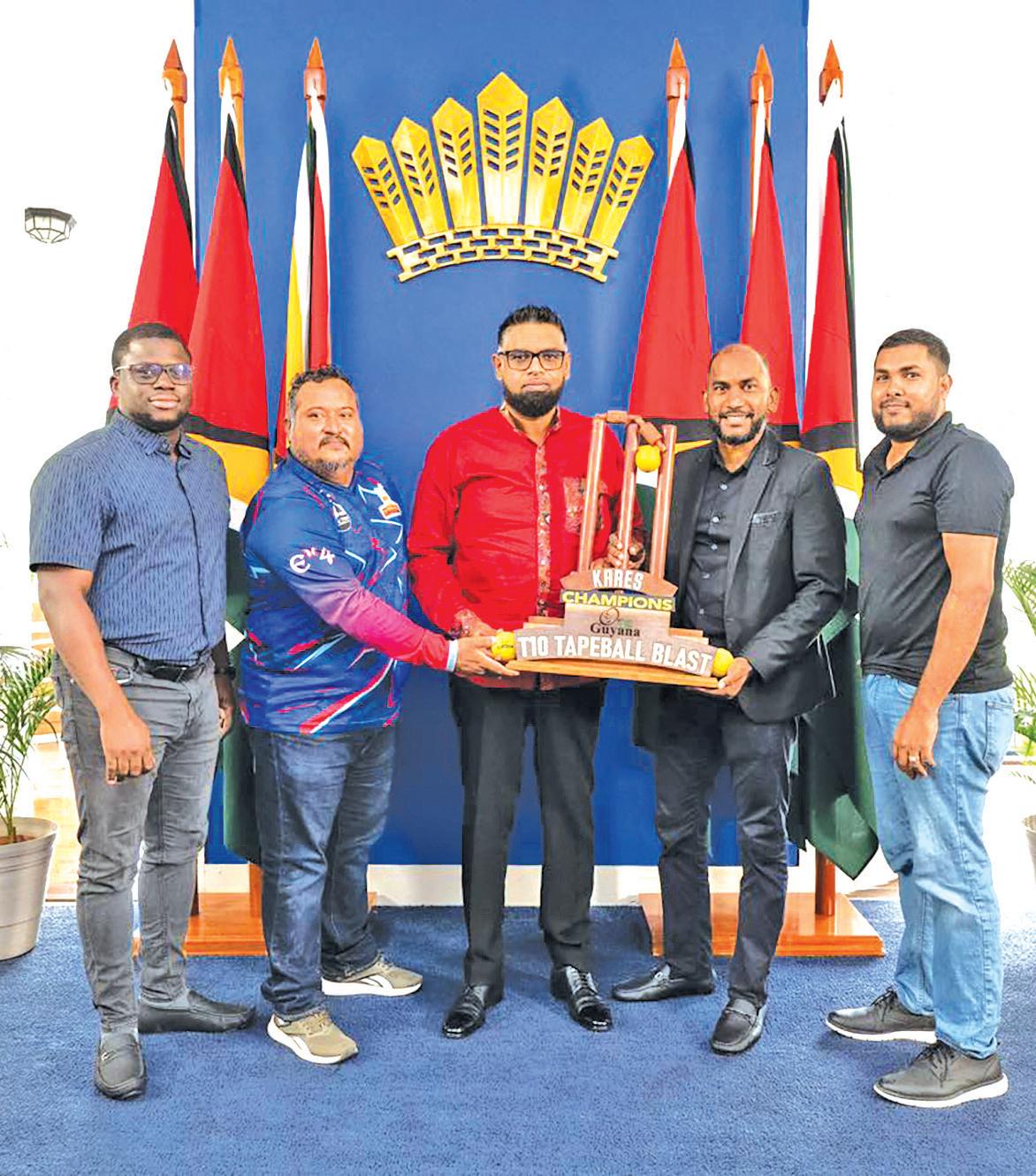
The tournament’s Berbice zone will be held from June 28 to 29; East Bank/West Demerara zone from July 5 to 6; Georgetown/East Coast Demerara zone from July 19 to 20; Essequibo zone from July 26 to 27; and Championship Finals on August 3, National Stadium, Providence.
Meanwhile, registration for the third edition is underway, and based on the enthusiastic response, organisers FL Sport anticipates reaching its target of 80 participating teams soon.
The team limit for each zone, except for the Georgetown/East Coast Demerara zone, is 16.
Some zones may be ex-
tended beyond 16.
The Georgetown/East Coast Demerara zone can accommodate up to 32 teams.
The Kares One Guyana T10 Tapeball Blast boasts a lucrative prize structure to reward zonal success and national championship aspirations.
The winning team from each zone will pocket

$300,000 and earn automatic qualification for the national finals.
The ultimate national champion will be awarded a staggering $1.7 million, while the national runners-up will receive $700,000.
The two losing semi-finalists will each receive $300,000, and the losing finalists at the zonal level
will also receive $100,000 each. Individual player performances are also significantly incentivised with attractive cash prizes and awards: The Most Valuable Player (MVP) will receive $150,000 and a motorcycle.
Prizes of $100,000 are designated for the players with the Most Runs and Most Wickets.
The Player of the Final at the national level will earn $75,000. And, $35,000 will go to the Super Striker and the player with the Best Economy rate. Some of these impressive prizes will also include custom-made trophies and televisions, adding to the prestige of individual achievements.
wins after Carty’s hundred and Forde’s record-equalling fifty


W105 balls.

balls before being bowled for a 19-ball 58.
plundered 106 runs off the last 42 balls.
Justin Greaves (44* off 36), who scored just seven runs of the 68-run stand with Forde, then accelerated along with Gudakesh Motie (18 off 8) to power West Indies to their second-highest total against Ireland as they
However, it started to rain during the innings break and did not relent, and play was eventually called off at around 5:20pm local time, ensuring Ireland go into the final ODI with an unassailable 1-0 lead. (ESPNcricinfo)
Shai Hope and Carty then rebuilt for West Indies, ensuring there was not a repeat of the top-order collapse they suffered in the first ODI, as they rotated strike well with quick singles and doubles amid the odd boundary.
Hope looked the more fluent in their 81-run stand off 90 balls as Carty slowly grew
est Indies marched to a mammoth total of 352 for 8 on the back of Keacy Carty’s second One-Day International (ODI) century and Matthew Forde’s record-equalling fifty as they looked to level the three-match series against Ireland, but the second ODI was washed out as rain did not allow Ireland’s chase to begin. Ireland sent West Indies in under slightly overcast conditions. The West Indies openers, Brandon King and Evin Lewis, got going with boundaries through the off side, but Barry McCarthy, who took four wickets in the first game, drew the outside edge from King to give Ireland the first breakthrough. The first bowling change also worked for Ireland as Lewis drove Josh Little straight to cover point in the bowler’s first over.
into the game. Hope also hit the first six of the game, coming down the track to Andy McBrine. But the West Indies Captain nicked off on 49 to give Liam McCarthy his first international wicket.
West Indies then picked up the tempo, with Carty doing the heavy lifting and Amir Jangoo happy to keep rotating strike. Carty brought up his half-century off 67 balls in the 27th over and then started to shift gears.
In the 29th over, he took on Barry McCarthy for two fours and a six. The six was probably his best shot; he backed away and slapped it over cover.
Jangoo was caught at short third off George Dockrell before Carty brought up his century in the 36th over, off
But when Carty was caught behind next over trying to cut Liam McCarthy and Roston Chase fell in the 44th with Paul Stirling taking a screamer at short fine leg, West Indies were reduced to 246 for 6 and suddenly were in danger of falling short of 300.
Enter Forde. He hit his second ball for a six over cover before hitting four sixes off the next over, bowled by Little – three of them off consecutive deliveries.
The next two balls he faced brought 10 runs as he scooped Thomas Mayes for four and six. Back-to-back sixes off Liam McCarthy in the next over saw him equal AB de Villiers’ record for the fastest ODI fifty, off just 16

Abiola Jackman etched her name in Guyana’s boxing history books by becoming the first Guyanese boxer, male or female, to win a gold medal at the Americas Boxing Confederation (AMBC) Elite Championships.
The historic moment came on Thursday evening in Ecuador, where she delivered a commanding performance in the final of the women’s 81kg division.
Facing Ecuador’s Daniela Espana in front of a home crowd, Jackman displayed poise, precision, and relentless aggression.
She dominated every round of the bout, with the judges unanimously awarding her the victory, except for Alexander Parra, who scored the first round in favour of Espana. The rest of the contest was all Jackman, who outboxed and outmuscled her opponent to claim the gold medal in style.
Jackman, who was also named Best Female Boxer at
this year’s Caribbean Boxing Championships in St Lucia, is riding an extraordinary wave of form.
Her victory adds to her growing legacy and makes her only the second Guyanese to medal at the AMBC Elite Championships.
The first was Desmond Amsterdam, who secured a bronze in 2022 after a semi-final finish; an achievement that also made him the first Guyanese amateur boxer to receive prize money under the International Boxing Association’s revised payment structure.
Guyana Boxing Association (GBA) President Steve Ninvalle was effusive in his praise for Jackman’s performance and its wider implications for the sport in Guyana, especially among women.
“This is a monumental moment not only for Abiola but for all of Guyanese boxing,” Ninvalle said. “We are extremely proud of her achievement. It goes to show that with hard

work, dedication, and the right opportunities, our boxers can rise to any occasion and make the country proud.”
Ninvalle also underscored the GBA’s long-standing commitment to gender equality in the sport, noting the crucial role played by Jackman and her sister Alesha in paving the way for the next generation of female fighters.
“We’ve always been strategic in ensuring equal opportunity for our female

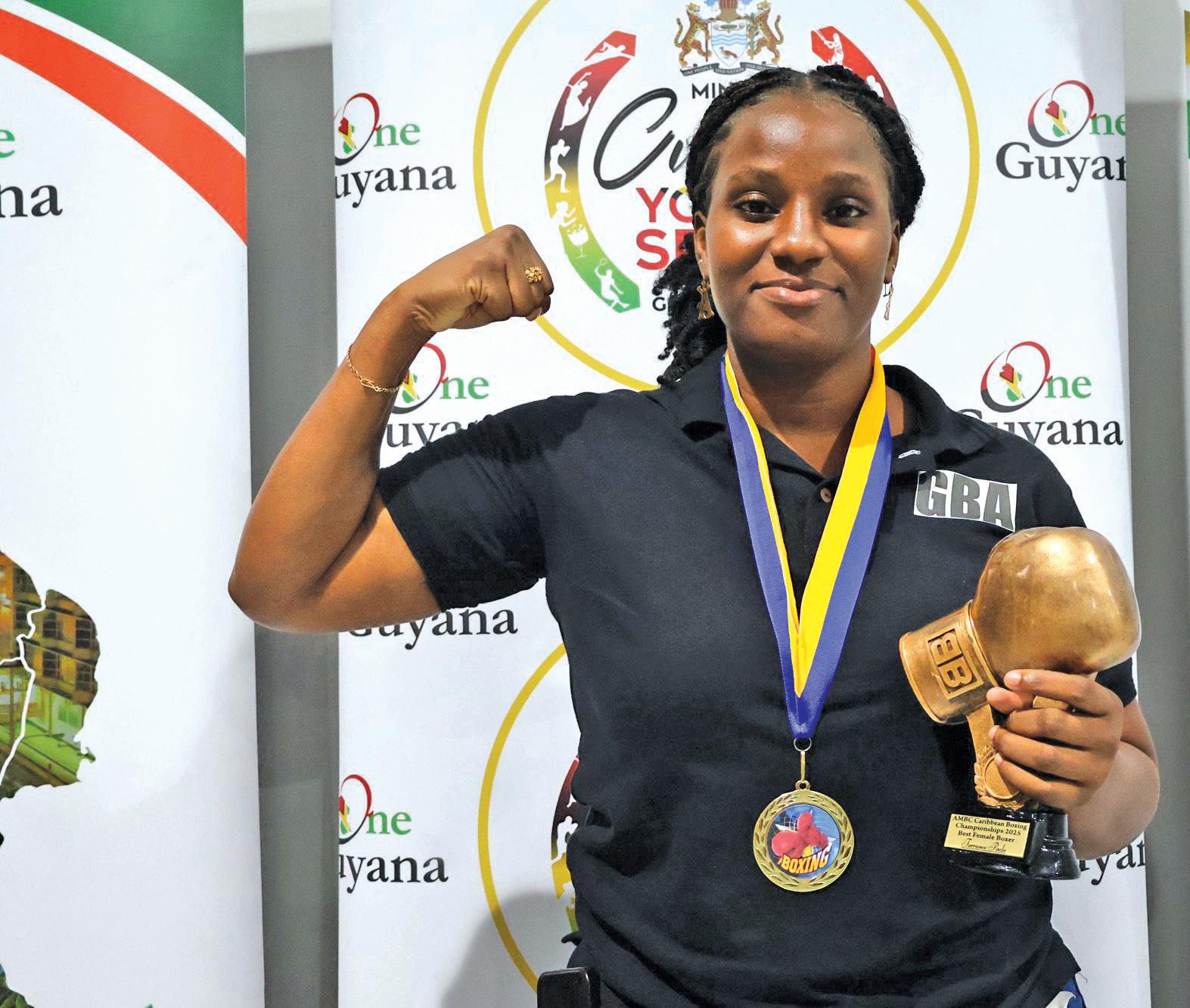
boxers,” he emphasised. “Abiola and Alesha Jackman have led by example, and Abiola’s gold medal is the fruit of that vision and effort. Abiola’s dedication to training, her discipline, and her willingness to represent Guyana at every opportunity, it’s all coming together now on the international stage.”
Reflecting on Jackman’s evolution in the sport, Ninvalle pointed out her consistent growth and work ethic as the backbone of her success.

“We know the kind of effort she puts in behind the scenes,” he said. “She always shows up ready to compete. To see her excel at one of the most prestigious tournaments in the Americas, it’s truly fulfilling.”
Looking ahead, Ninvalle reaffirmed the GBA’s commitment to nurturing emerging talent and giving both male and female boxers the platform they need to succeed on the international stage.
“We remain focused on our
mission to provide exposure and development for our young, emerging, and elite boxers,” he stated.
According to Ninvalle, “Jackman’s success isn’t just about her. It’s a spark, an inspiration to others. We believe her gold medal will motivate not just other female fighters, but all boxers in Guyana, to stay focused, work hard, and believe that they too will get their moment in the spotlight.”
